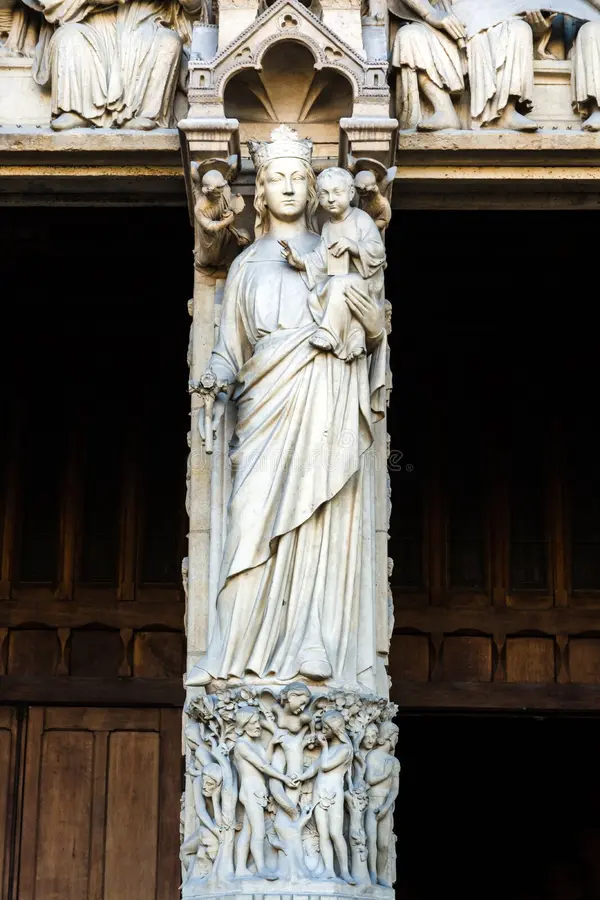HA 10 Final Study Guide
1/68
There's no tags or description
Looks like no tags are added yet.
Name | Mastery | Learn | Test | Matching | Spaced | Call with Kai |
|---|
No analytics yet
Send a link to your students to track their progress
69 Terms
Trajan's Column, 2nd century CE, Rome, Italy. Roman Empire
Conquering and colonization
Narrative reliefs depicted as it goes up the column
Stairs on the inside
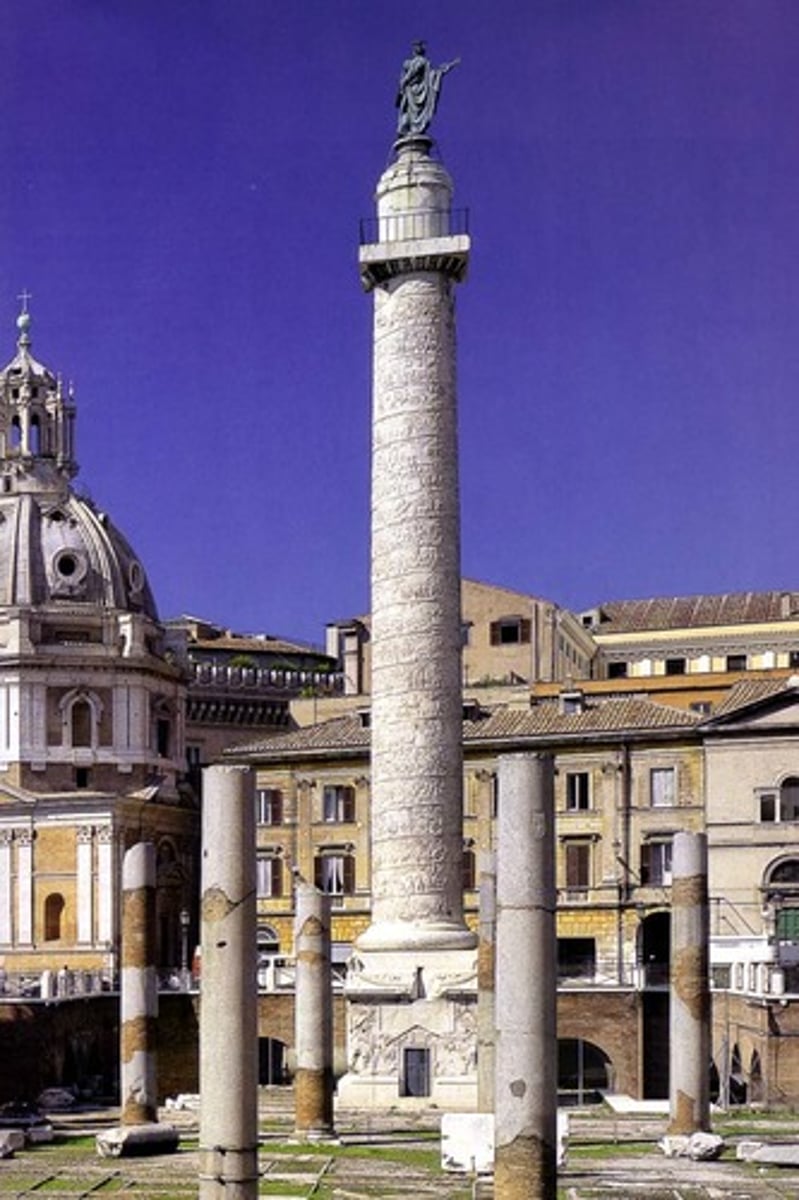
Amphitheater Flavium, 1st century CE, Rome, Italy. Roman Empire
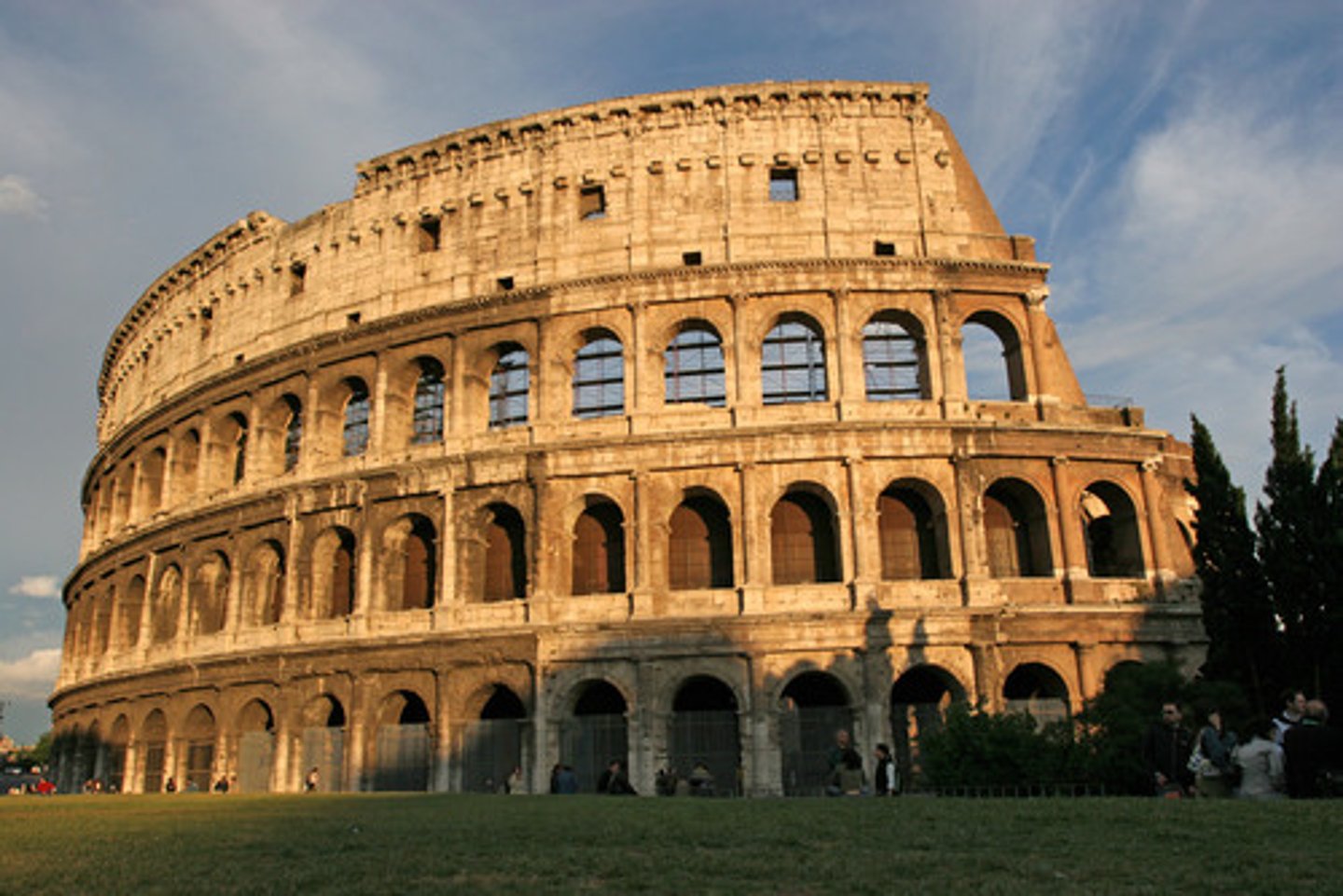
Al-Khazneh (Treasury), 2nd century CE, Petra, Jordan. Roman Empire
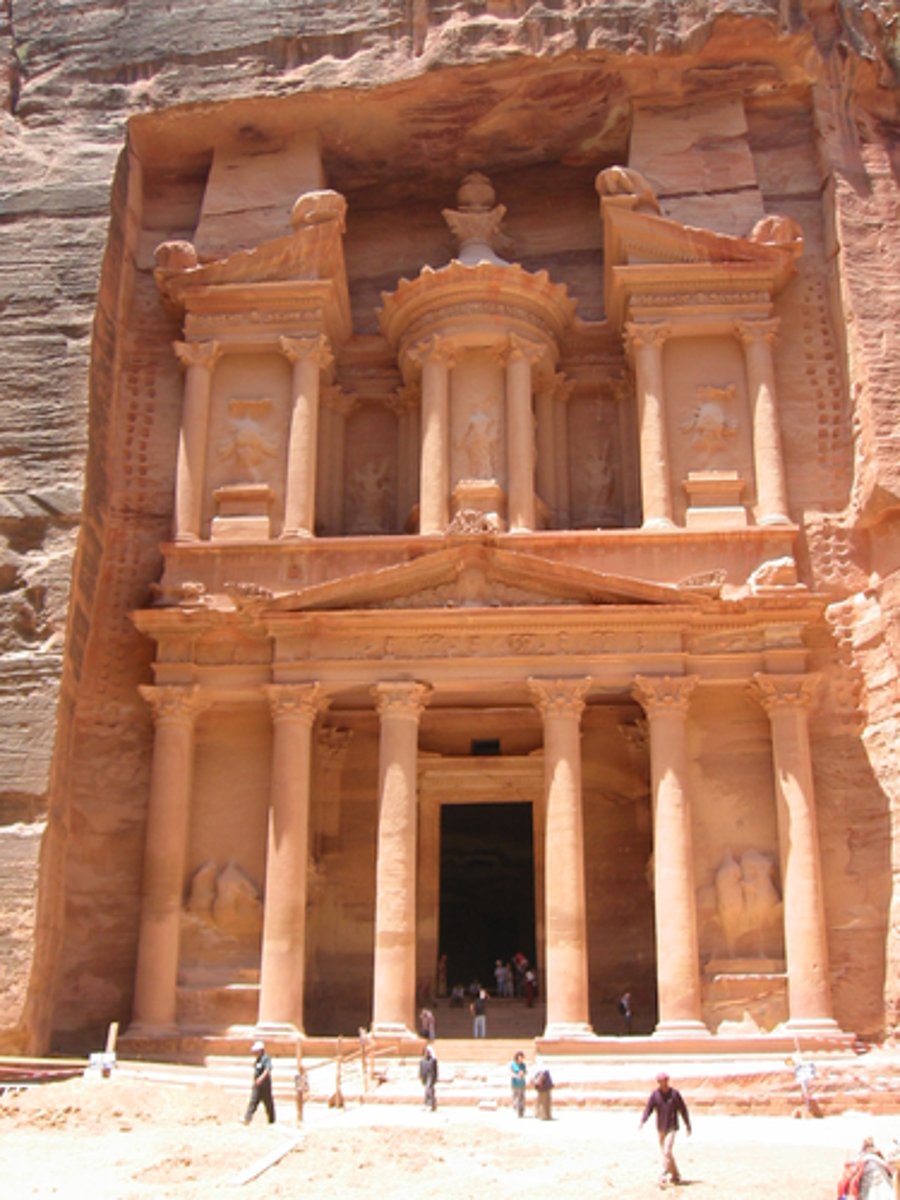
Pantheon, 2nd century CE, Rome, Italy. Roman Empire
Also known as Hadrian’s version of the Pantheon
Hadrian loved dome-like architecture
One complete circle
LARGEST REINFORCED DOME
Could not have been constructed without cement— required three different layers of cement
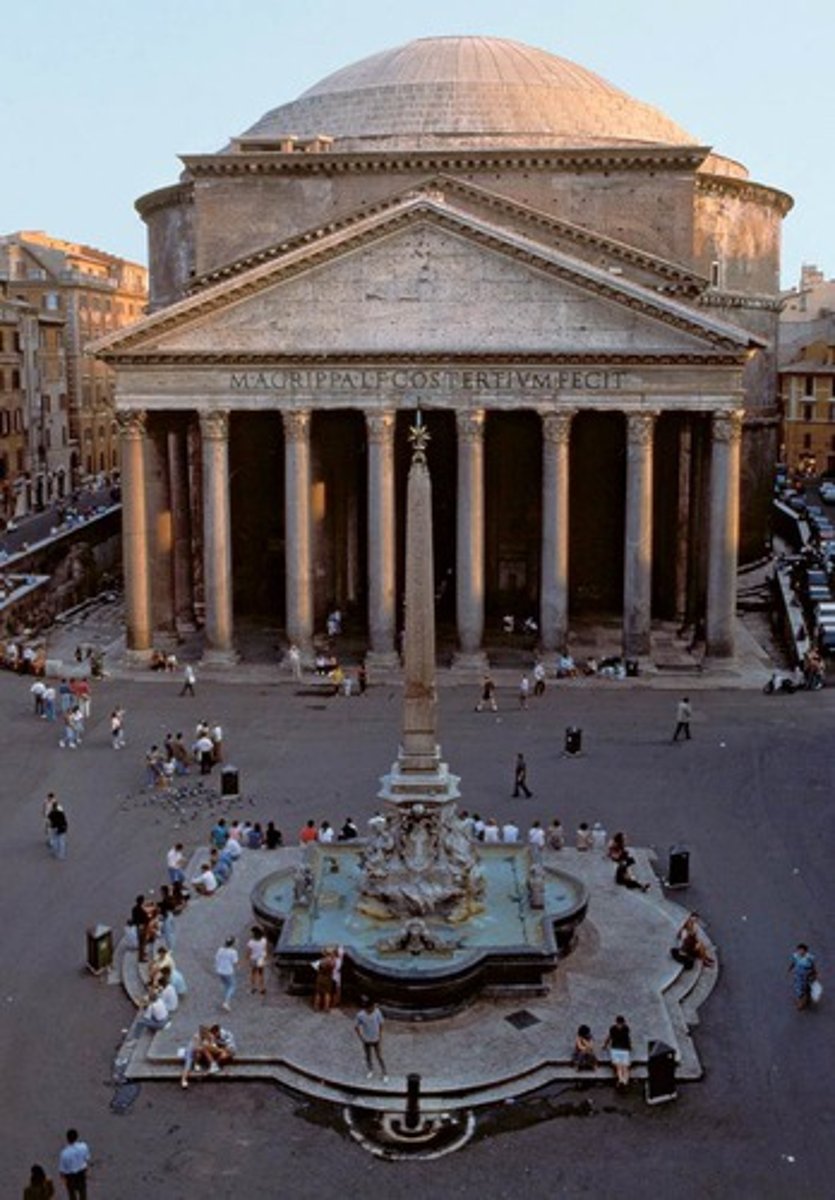
Equestrian statue of Marcus Aurelius, 2nd century CE, Rome, Italy. Roman Empire
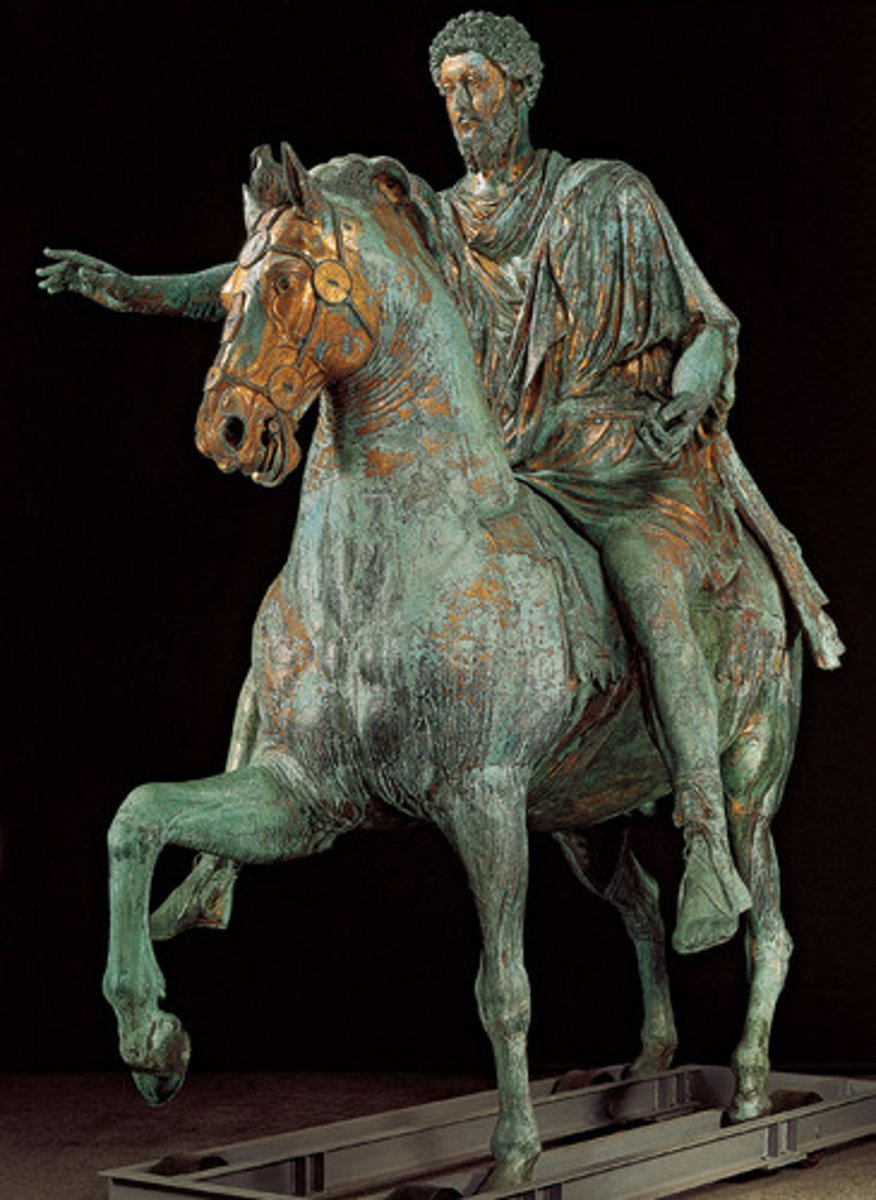
Mummy Portrait of Woman from Hawara, 2nd century CE, Egypt. Roman Empire
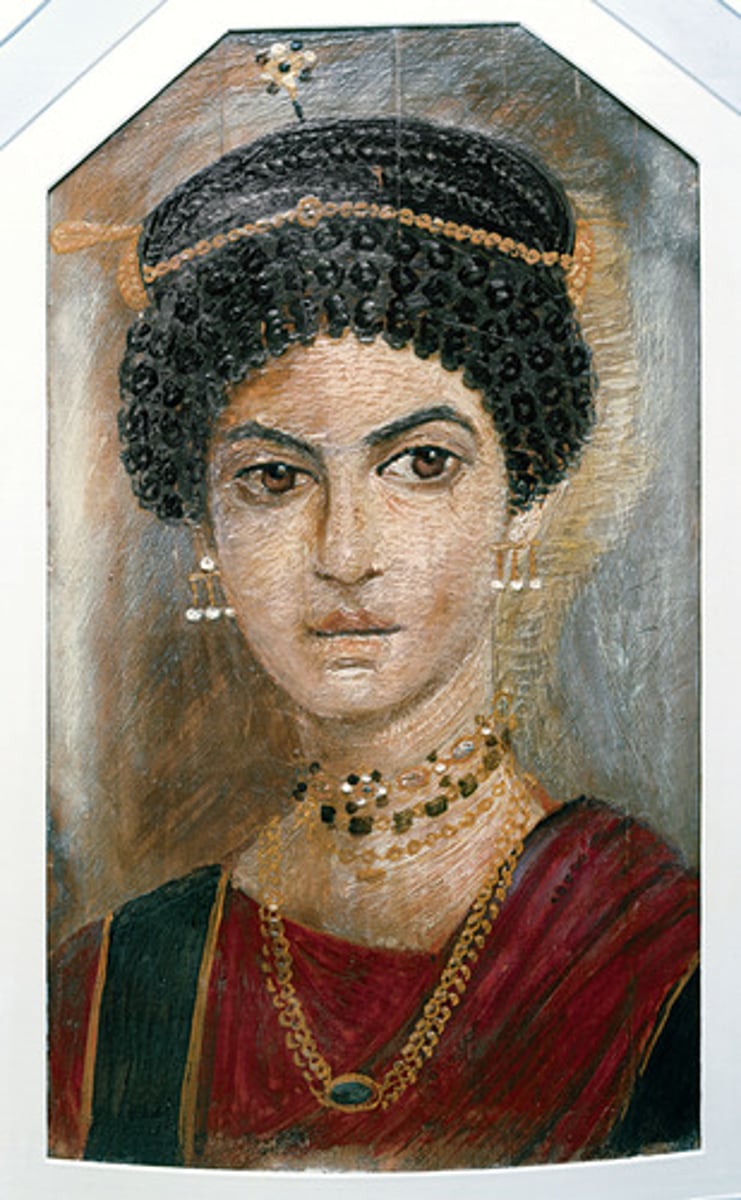
Mummy Portrait of Priest of Serapis, 2nd century CE, Egypt. Roman Empire
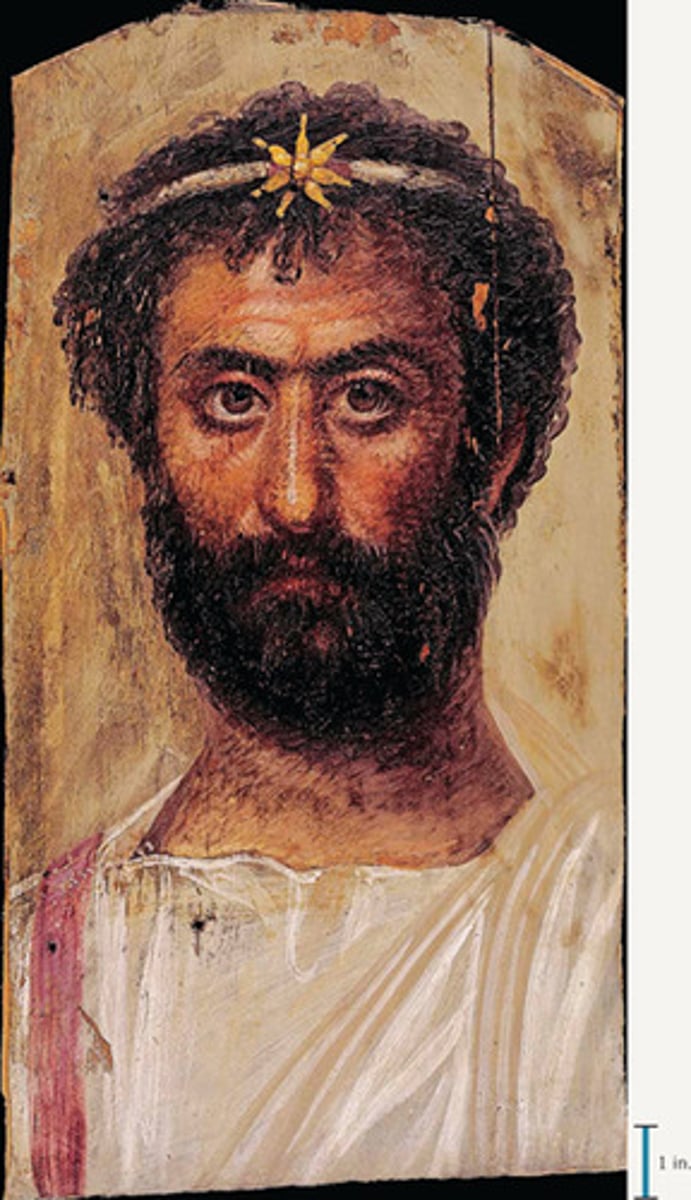
Group Portrait of Septimius Severus, 2nd century CE, Egypt. Roman Empire
Only known painted portrait of a Roman Emperor
May have been commissioned upon the imperial family’s visit to the province of Aegyptus, Egypt
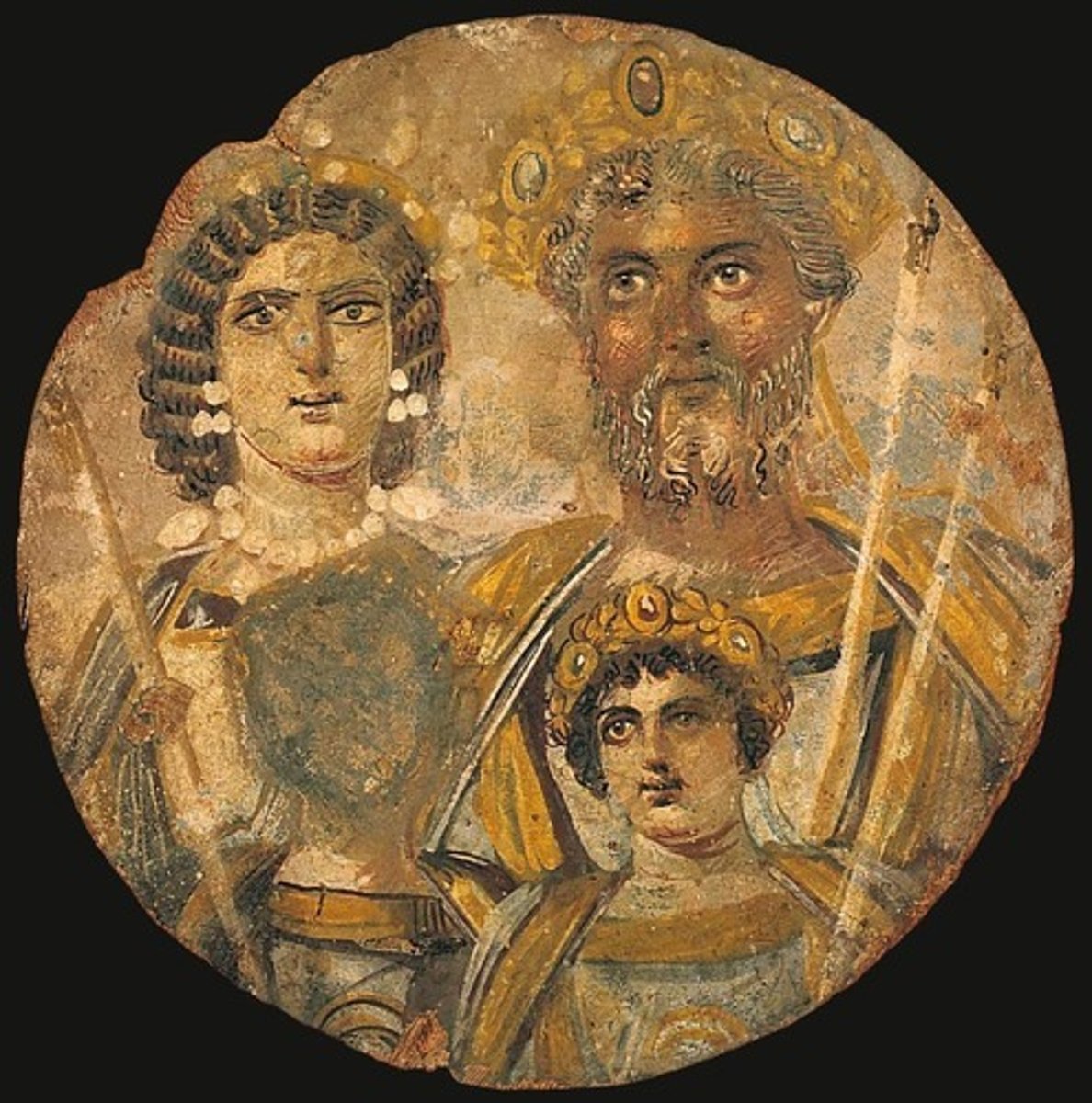
Battle of Romans and barbarians, sarcophagus, 3rd century CE, Rome, Italy. Roman Empire
Found in the tomb of Vigna Bernusconi
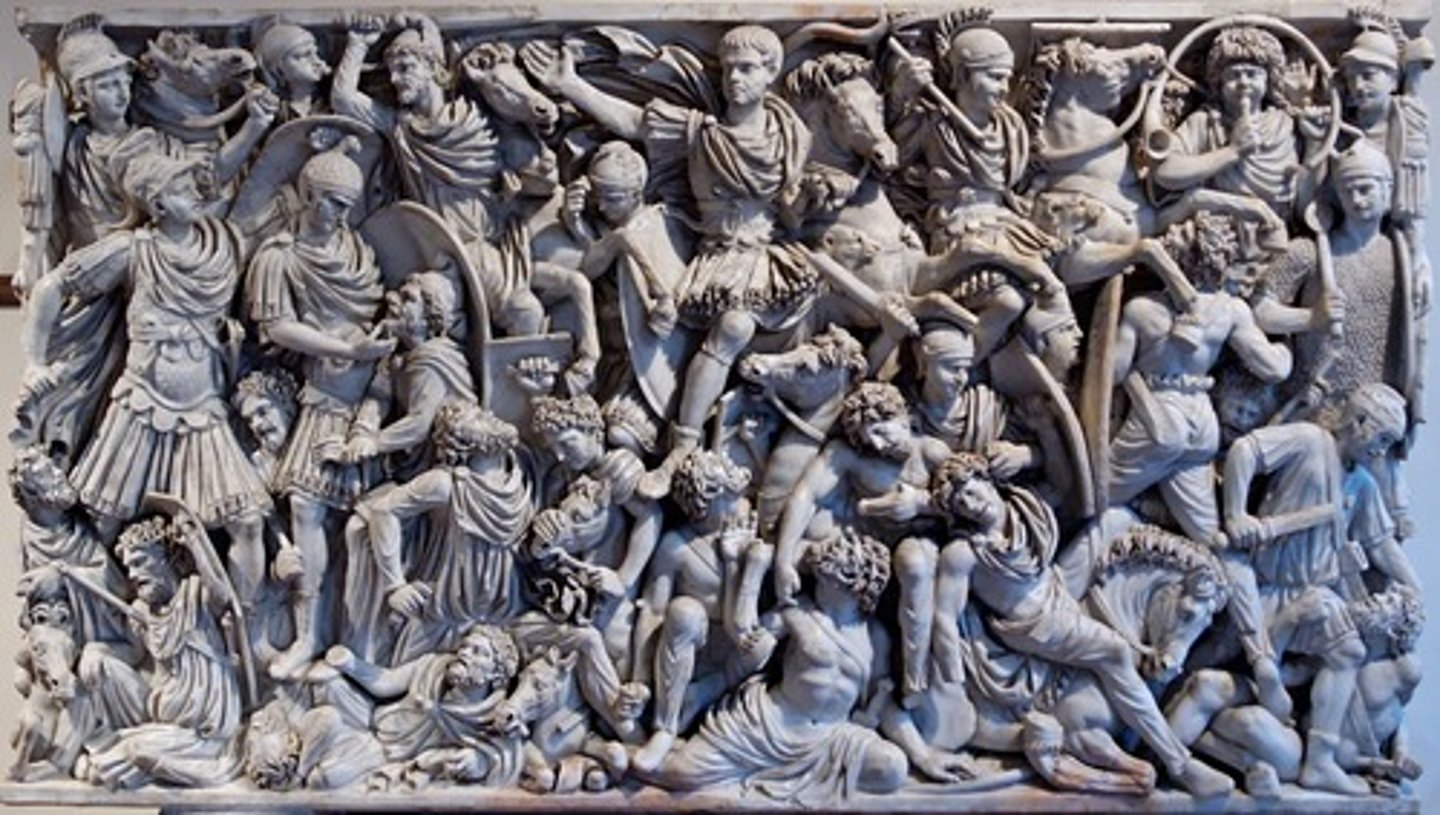
Colossal Statue (head) of Constantine, 4th century CE, Rome, Italy. Roman Empire
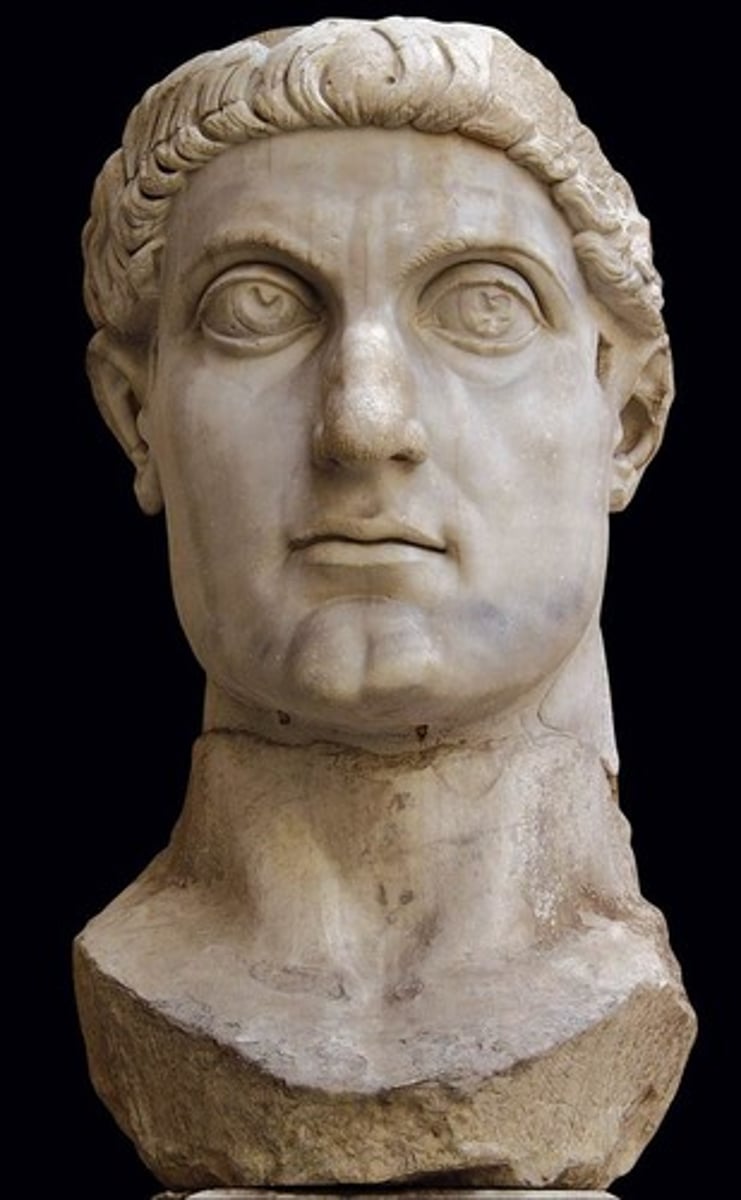
The Arch of Constantine, 4th century CE, Rome, Italy. Roman Empire
Hadrian
Trajan
Marcus Aurelius
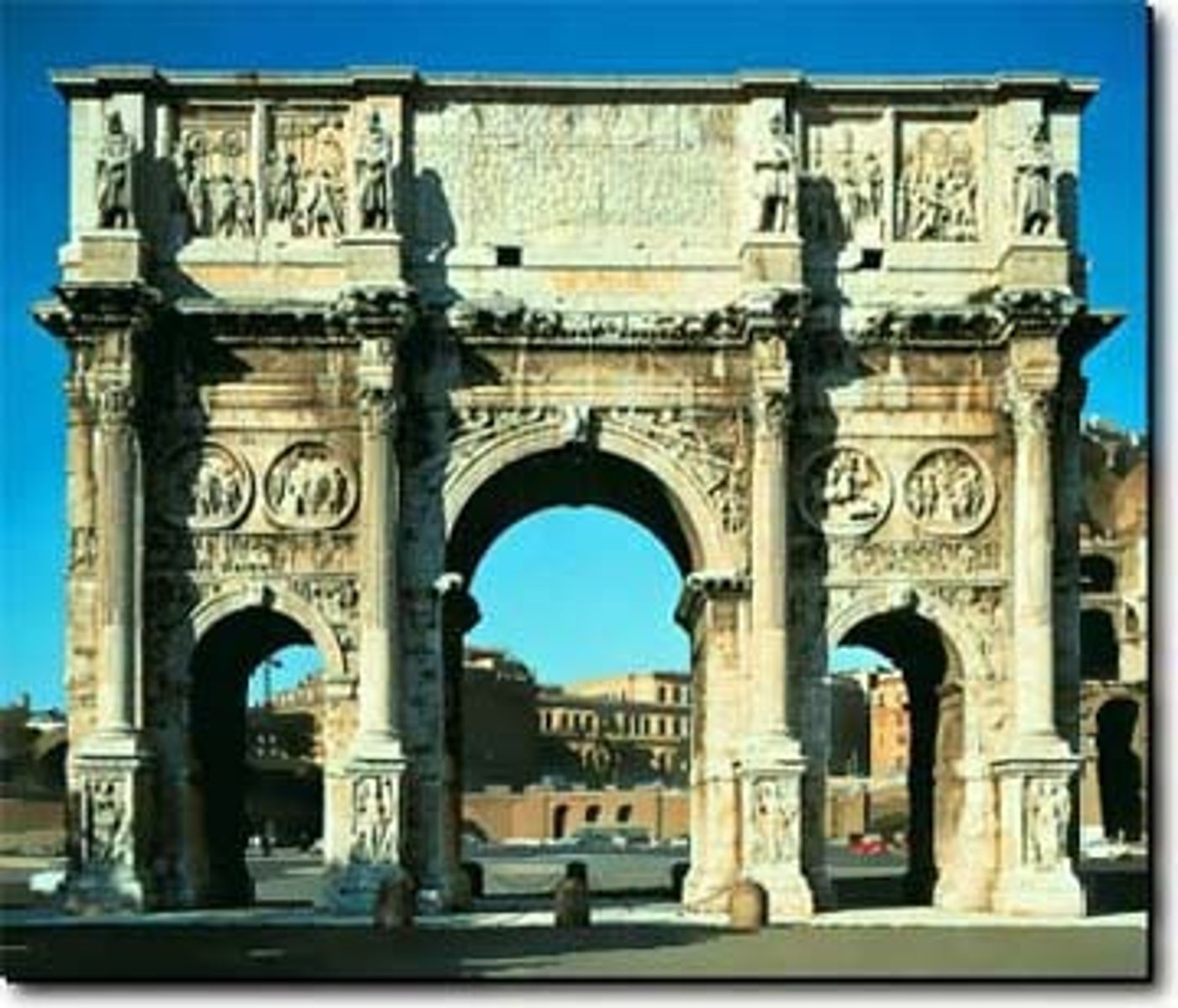
Medallion with Portrait of Constantine, 4th century CE, Roman Empire
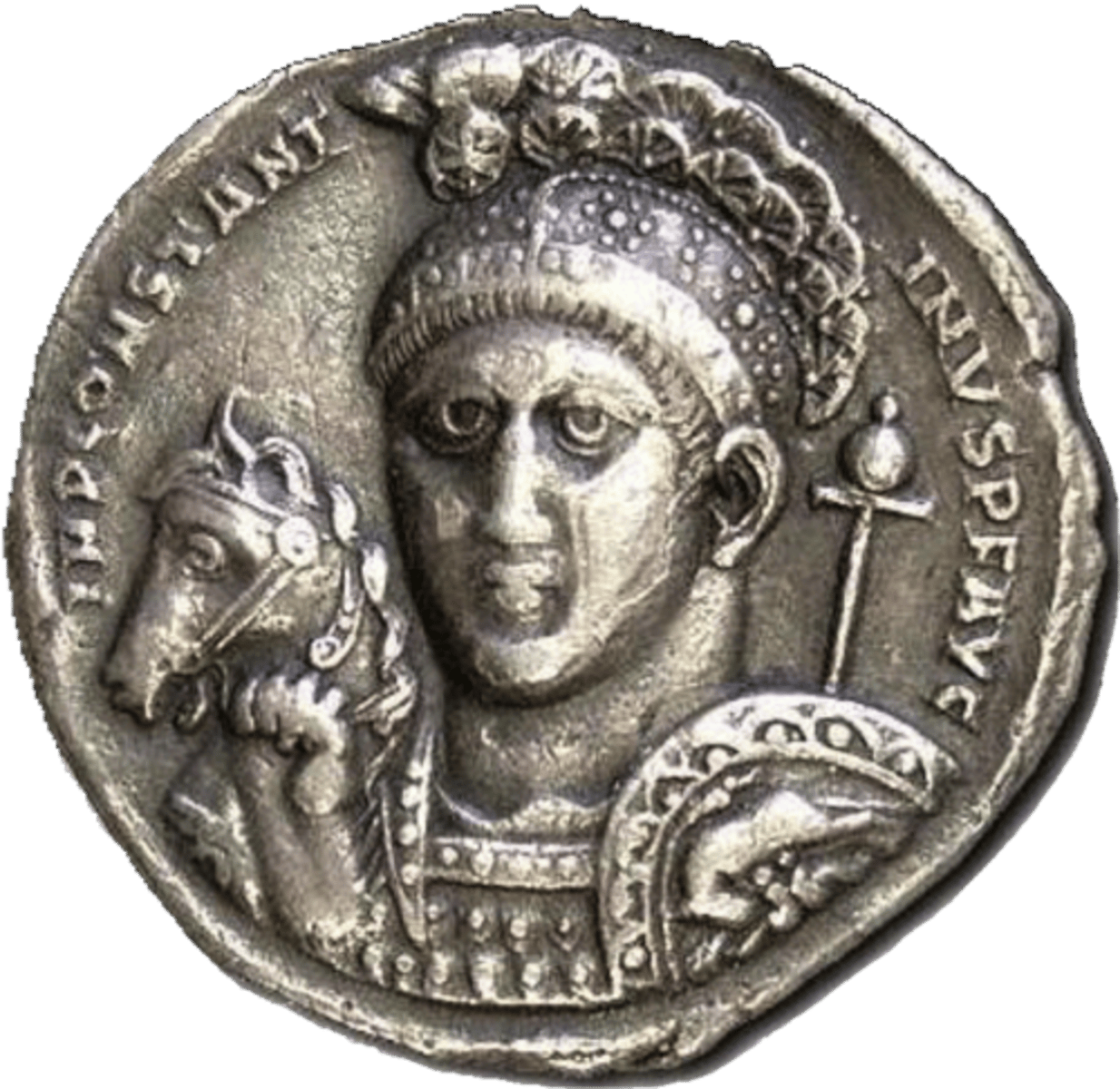
Sarcophagus of Junius Bassus, 4th century CE, Rome, Italy. Late Antiquity
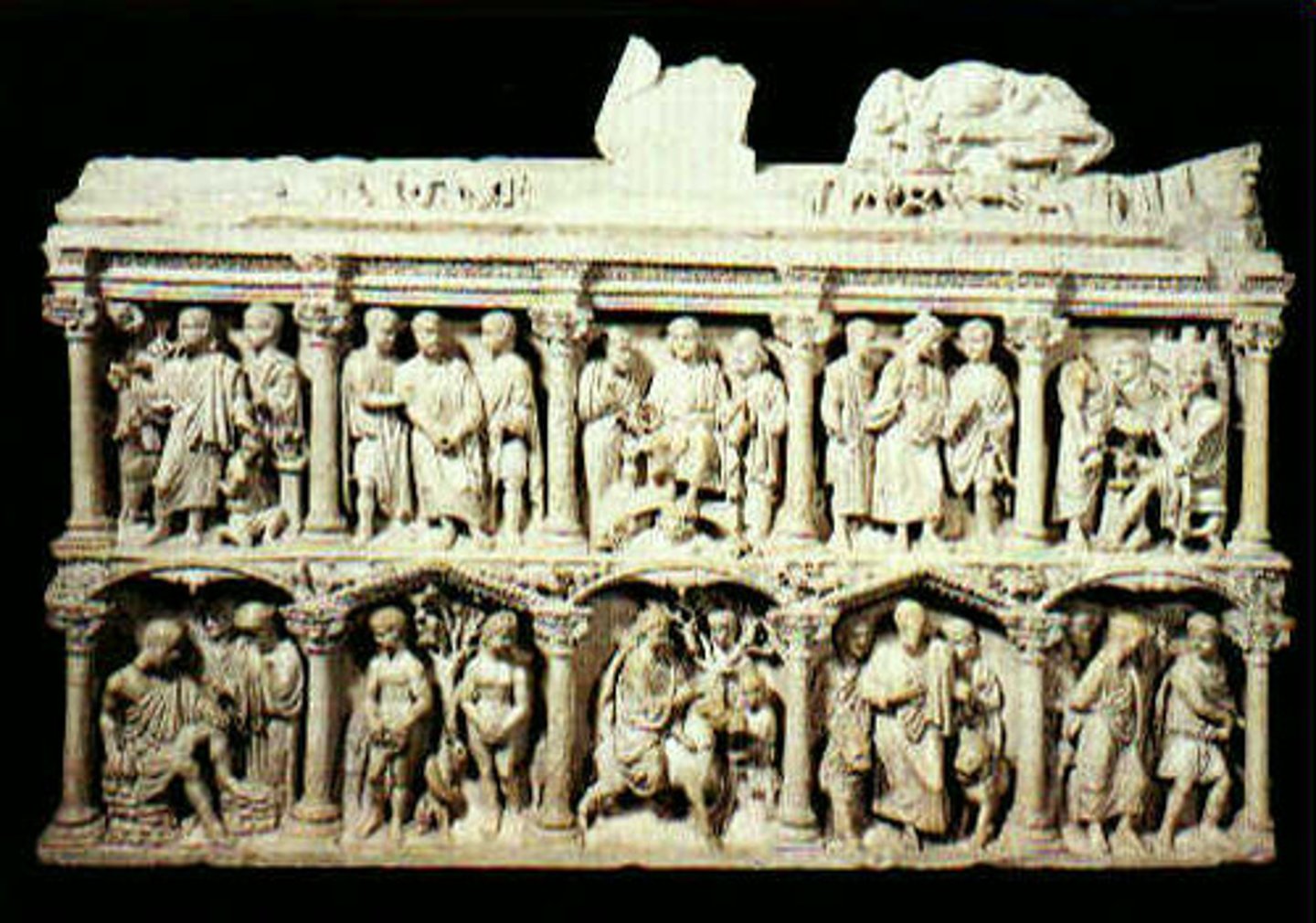
Sarcophagus with Philosopher, 3rd century CE, Rome, Italy. Late Antiquity
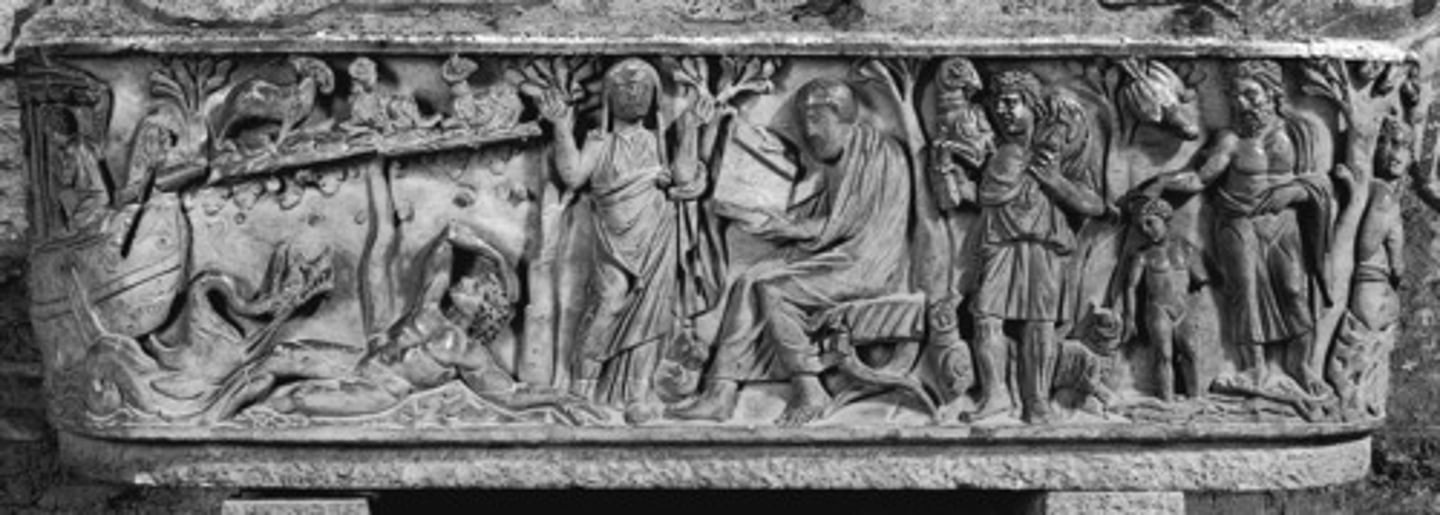
Statue of Christ as Good Shepard, 4th century CE, Rome, Italy. Late Antiquity
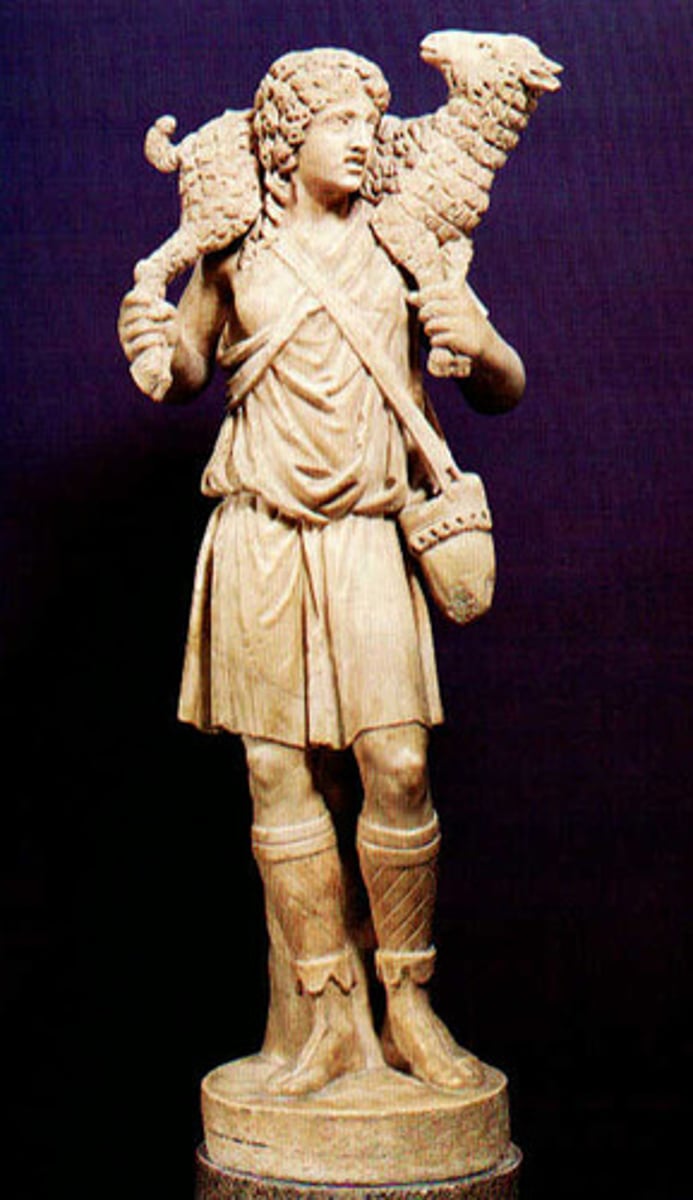
Saint Michael the Archangel, 6th century CE, Turkey. Byzantine
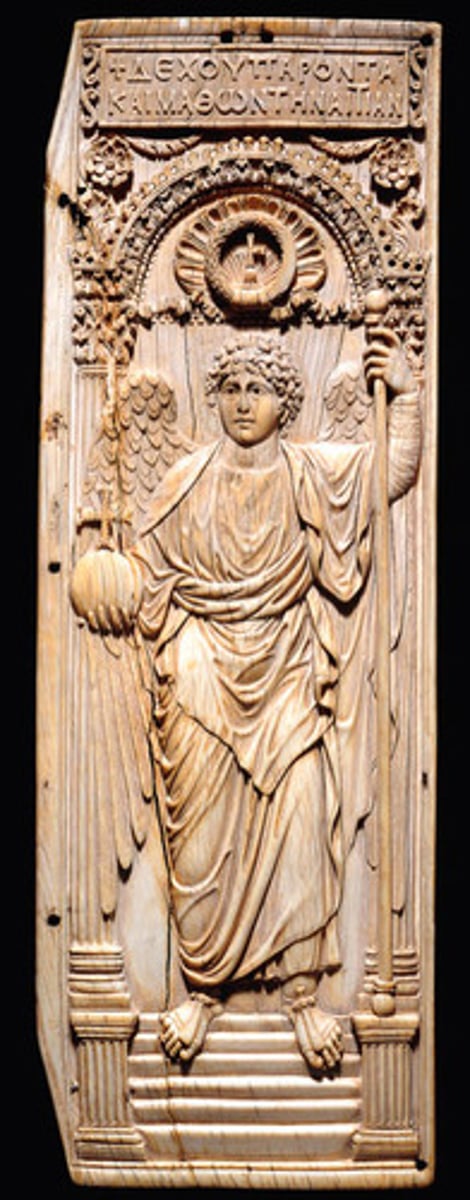
Justinian (Barberini Ivory), 6th century CE, Constantinople. Byzantine
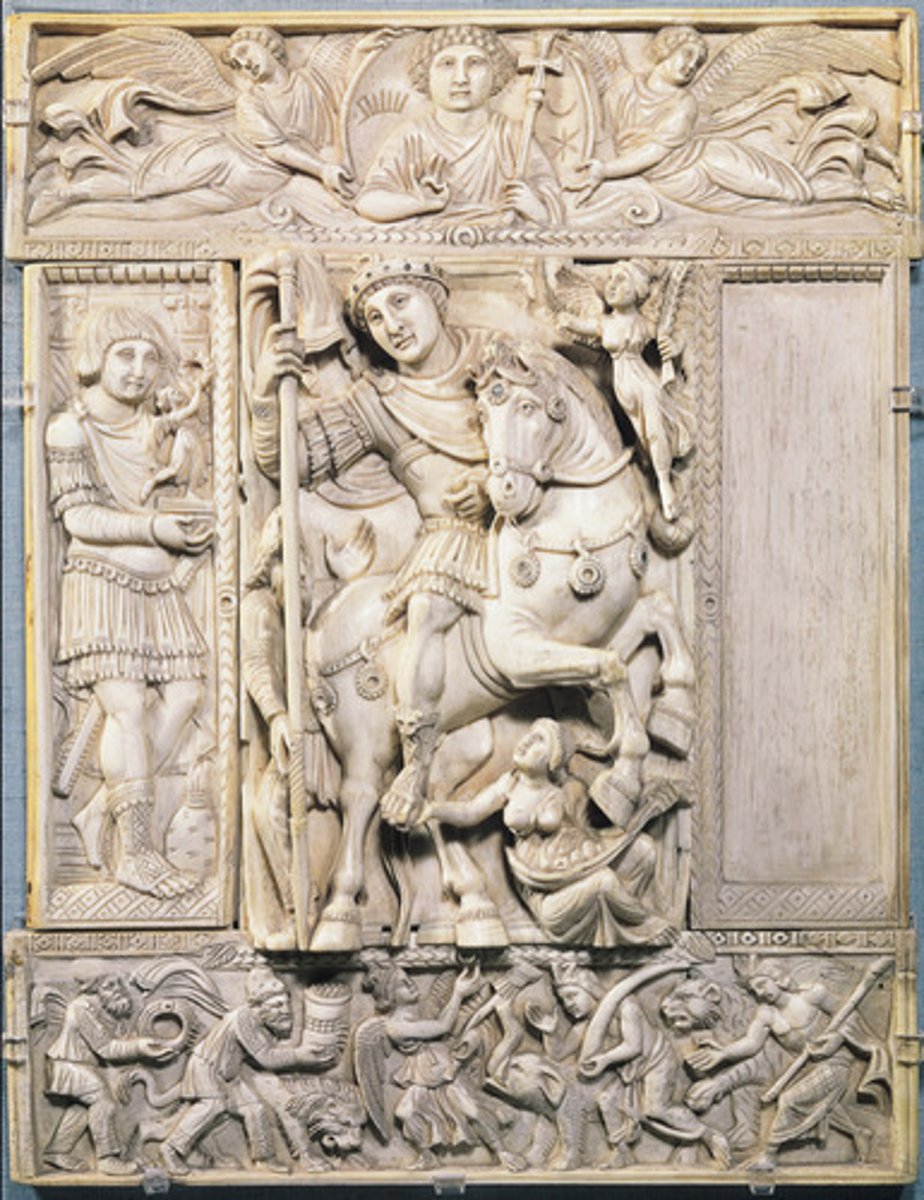
Hagia Sophia, 6th century CE, Constantinople. Byzantine
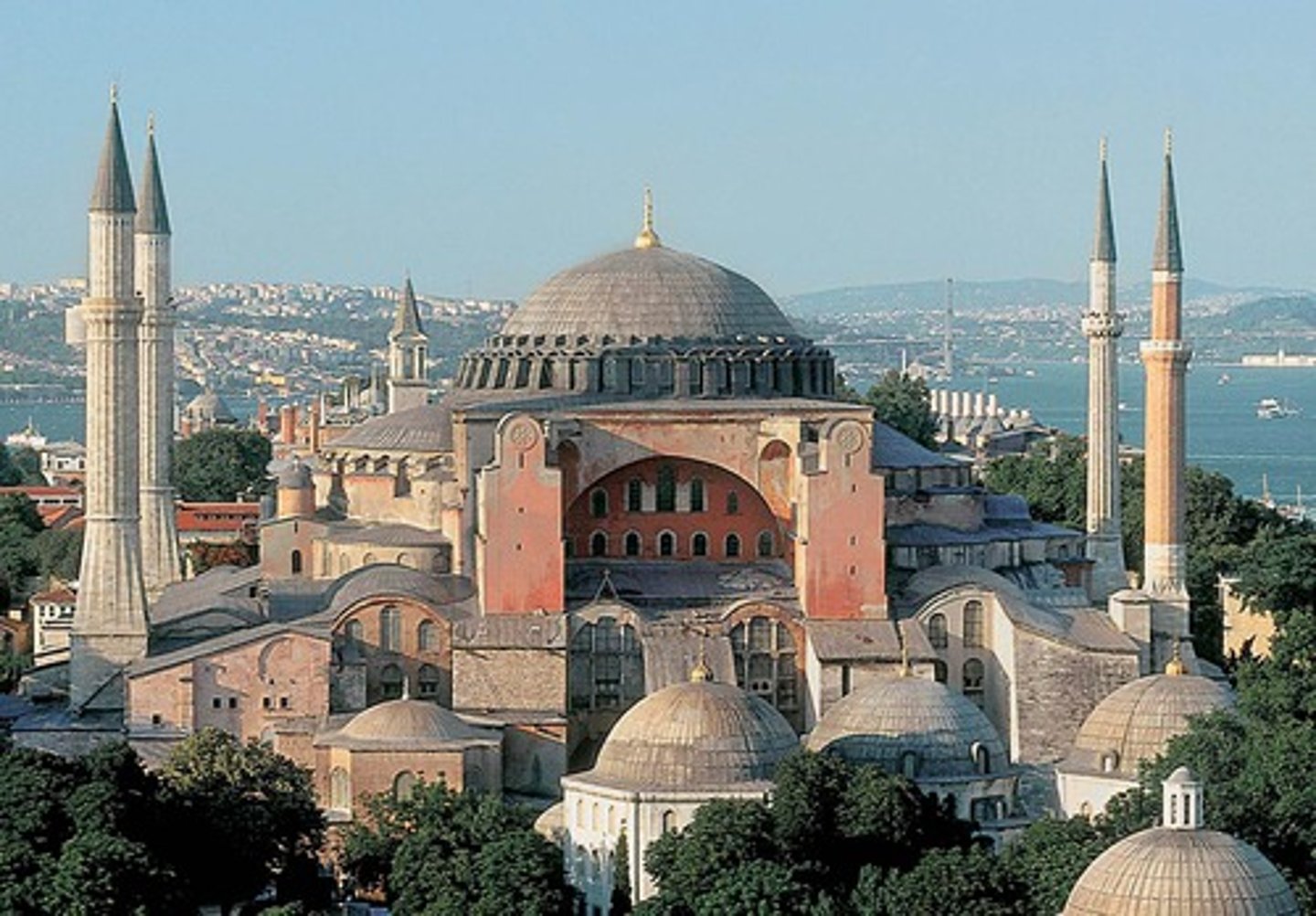
Theodora and attendants, 6th century CE, Sin Vitale, Italy. Byzantine
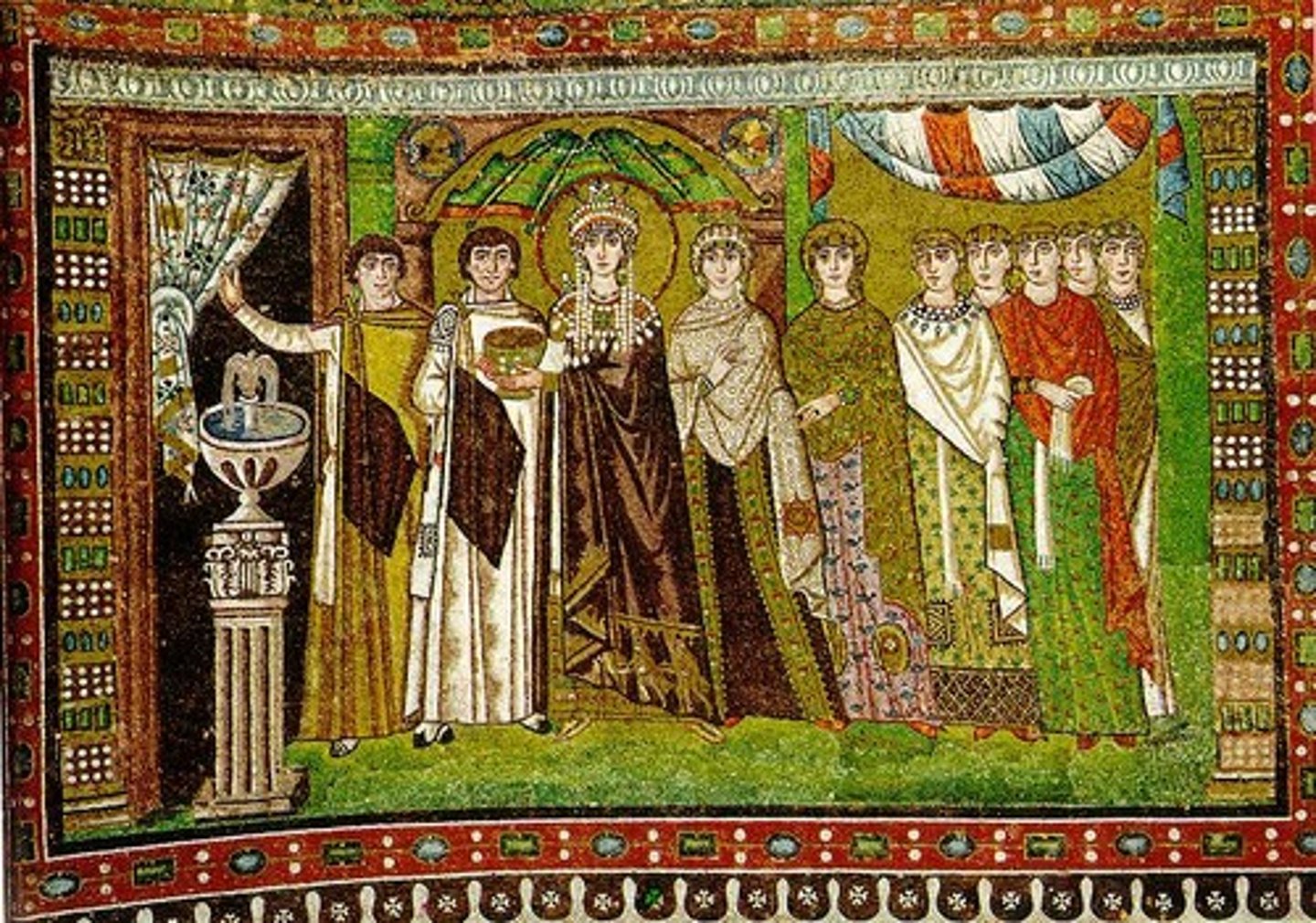
Saint Apollinaris amid sheep apse mosaic, 6th century CE, from The Basilica of Saint’Apollinare in Classe, Italy. Byzantine
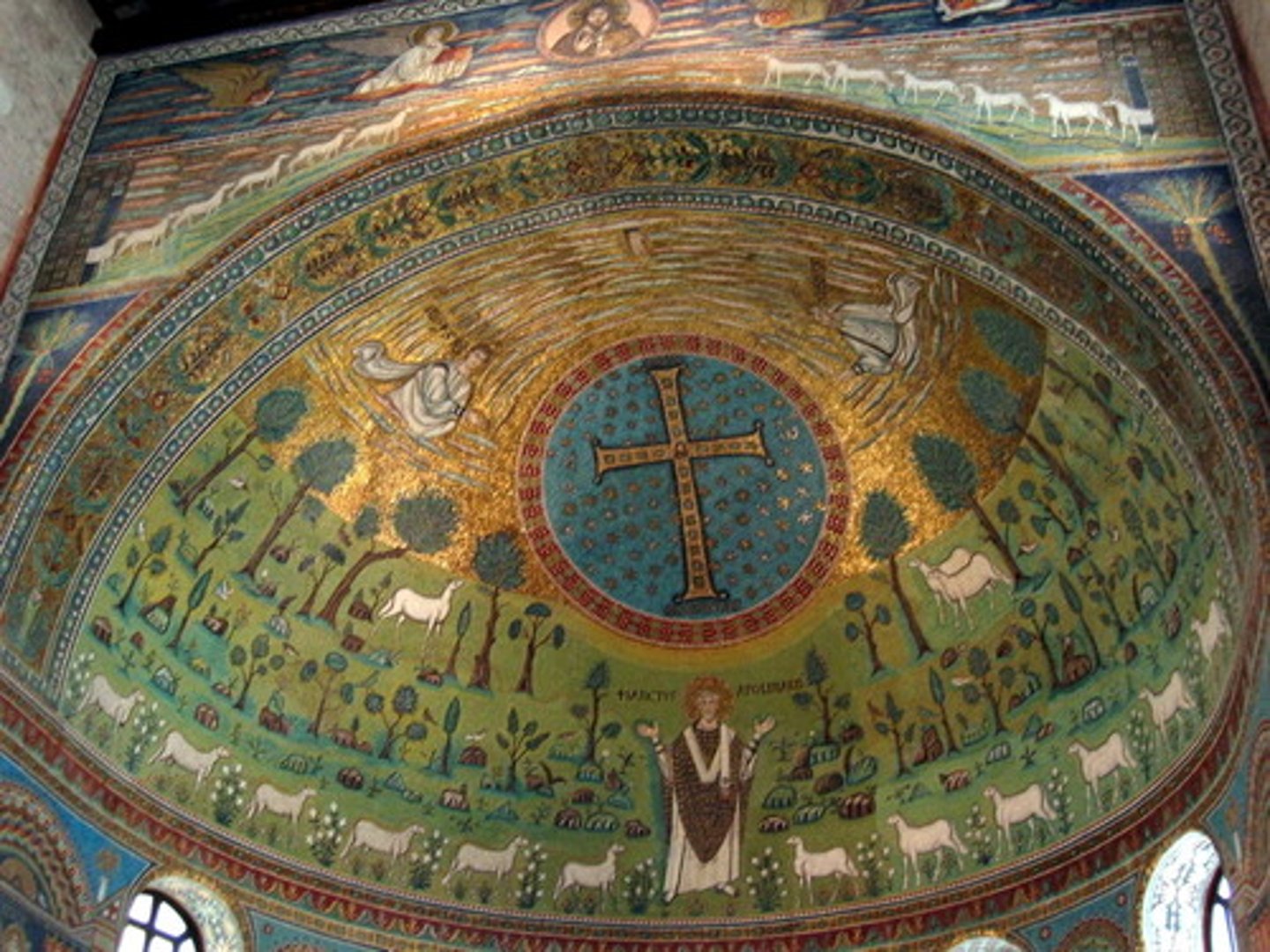
Christ blessing (icon), 6th century CE, Mount Sinai, Egypt. Byzantine
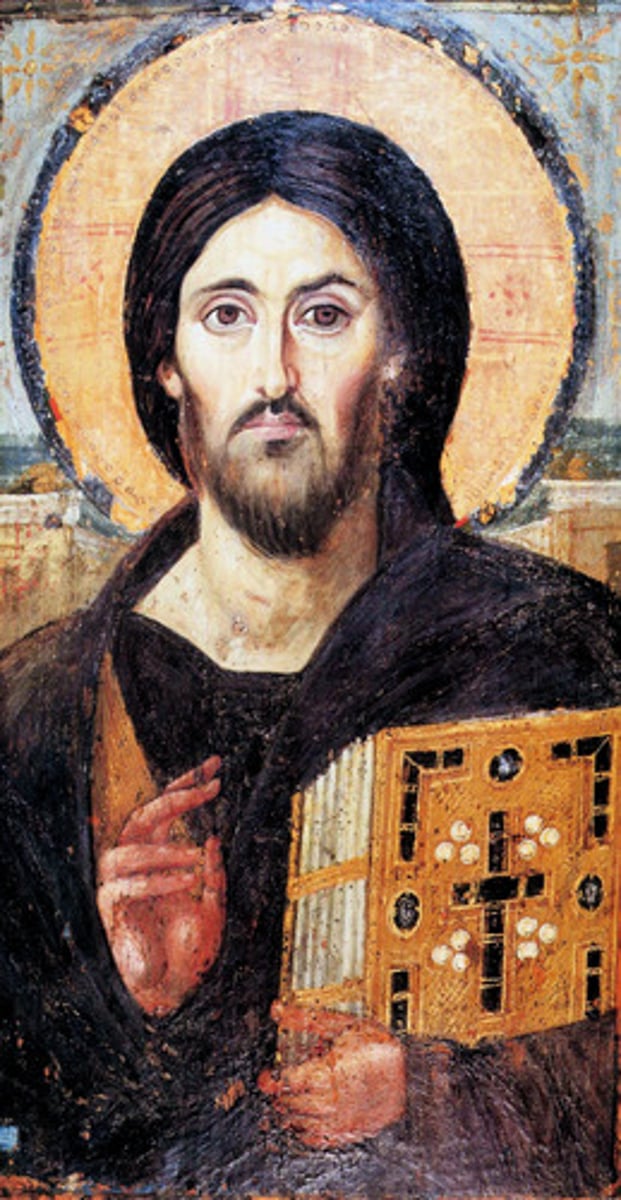
Theotokos and Child, 9th century CE, Hagia Sophia Grand Mosque, Turkey. Byzantine
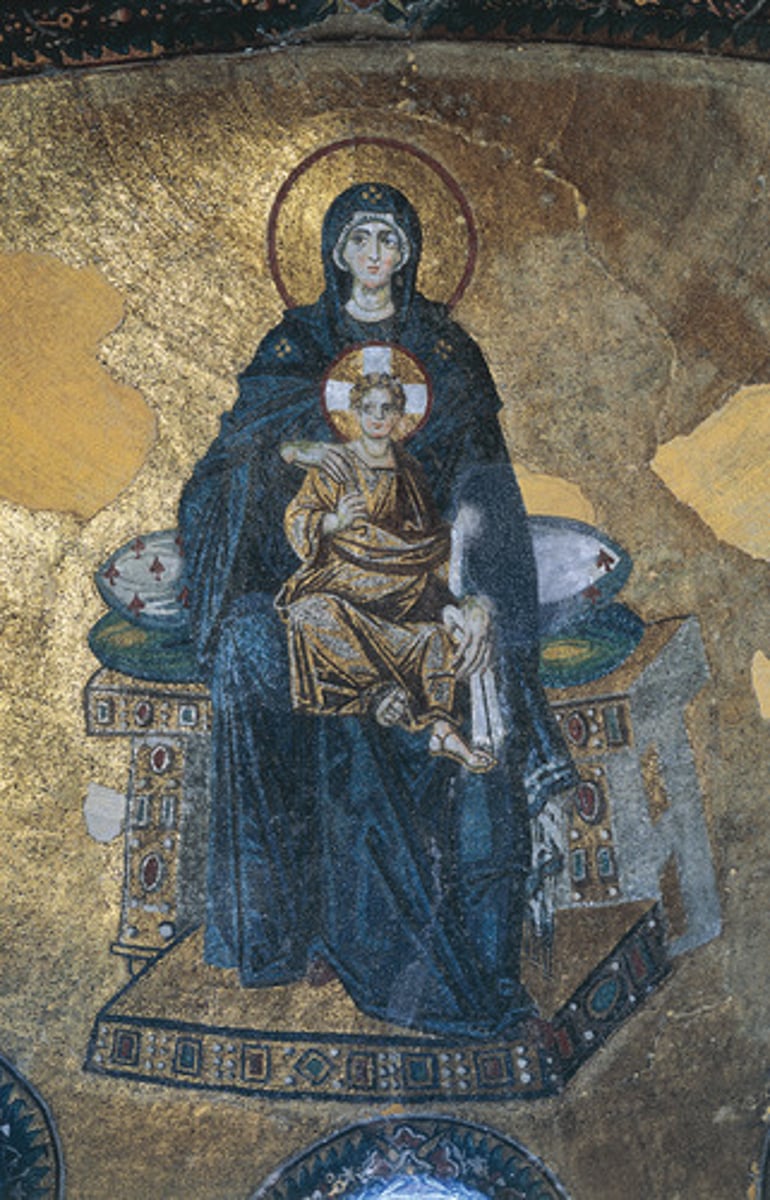
Norman King William II and Christ, 12th century CE, Monreale Cathedral. Byzantine
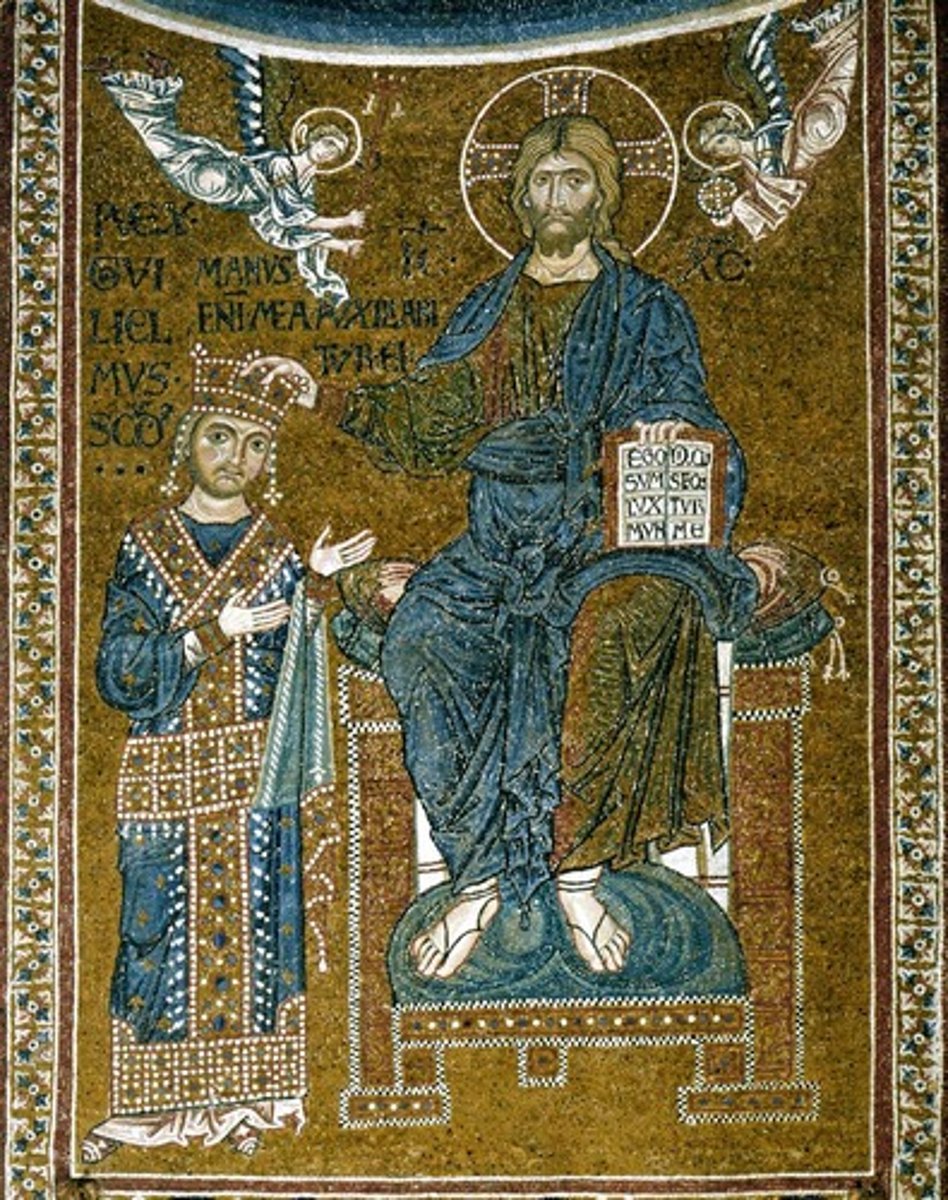
King with the Virgin Mary, 12th century CE, Monreale Cathedral. Byzantine
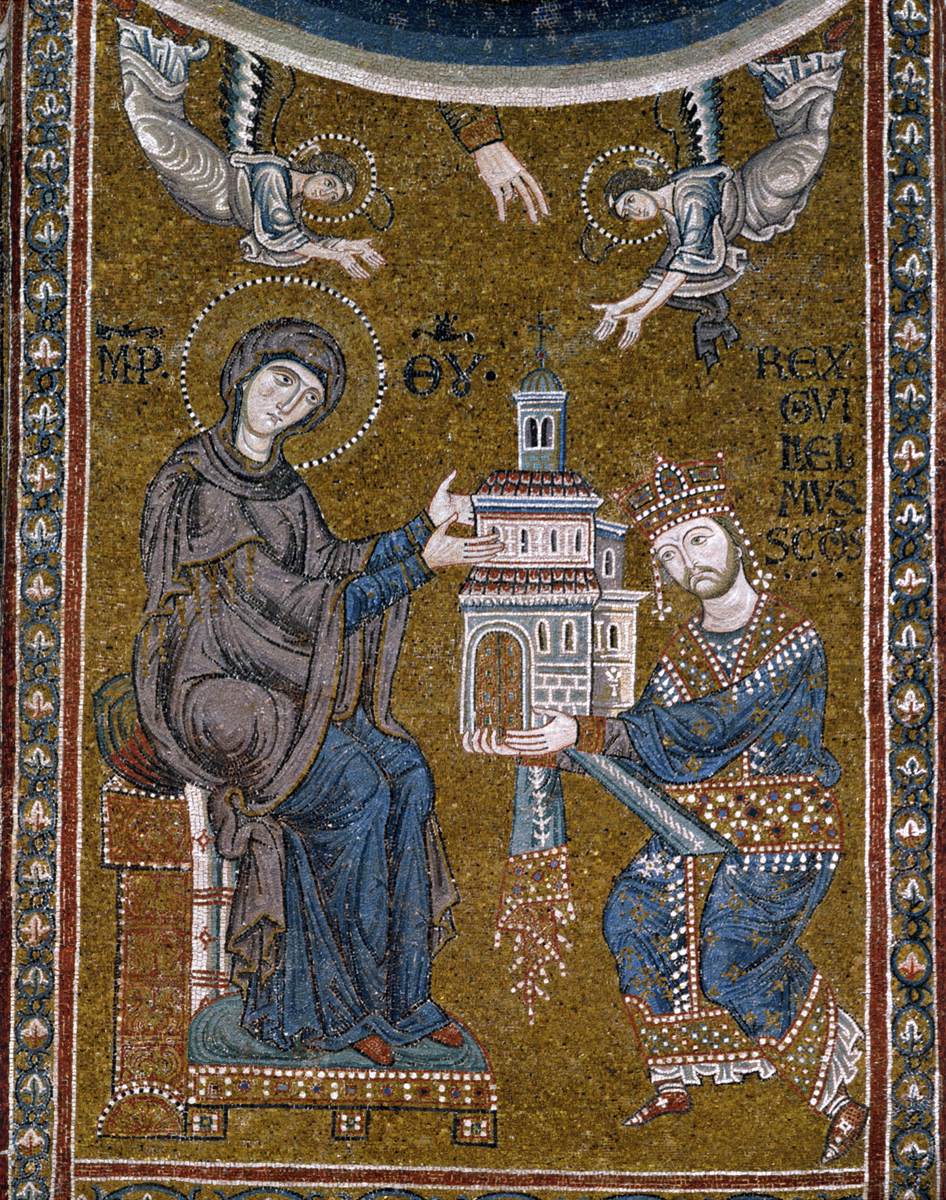
Annunciation, 14th century CE, Church of the Virgin, Macedonia. Byzantine
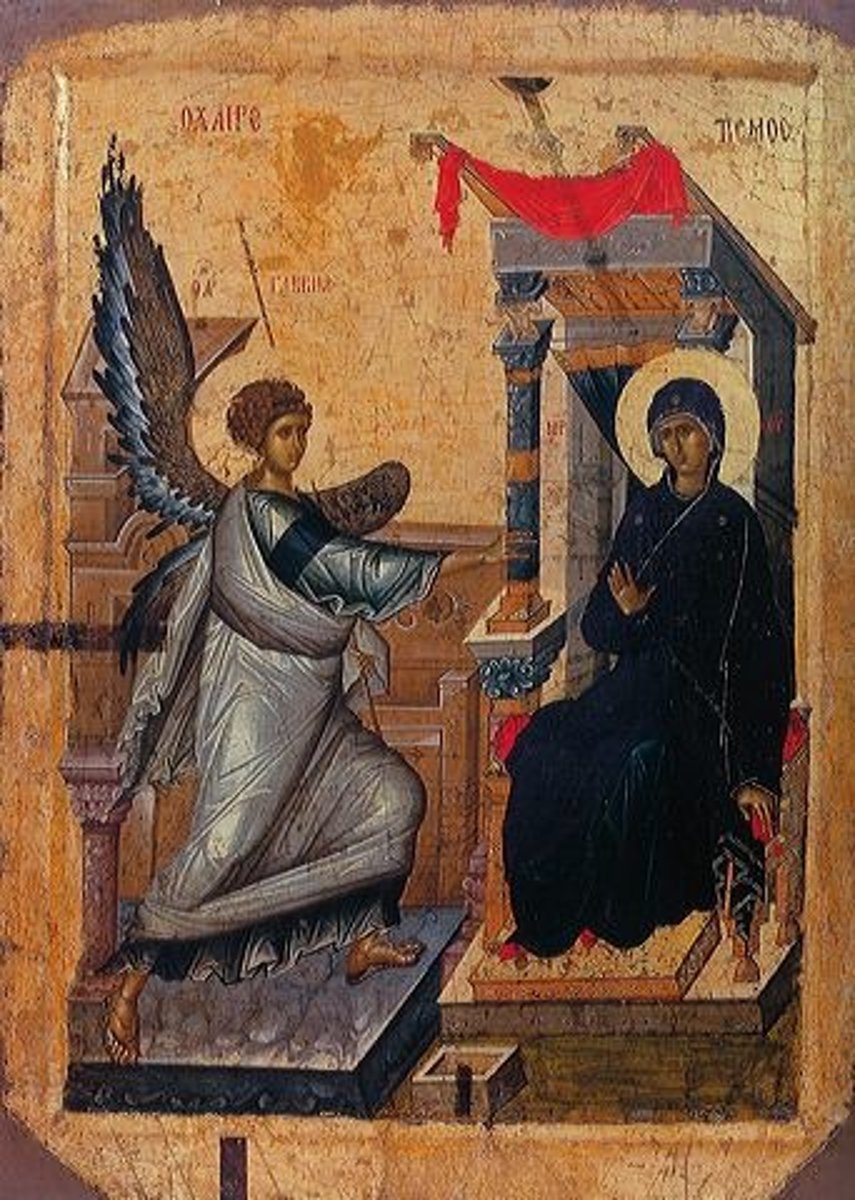
Nerezi, Lamentation wall painting, 12th century CE, Saint Pantaleimon, Macedonia. Byzantine
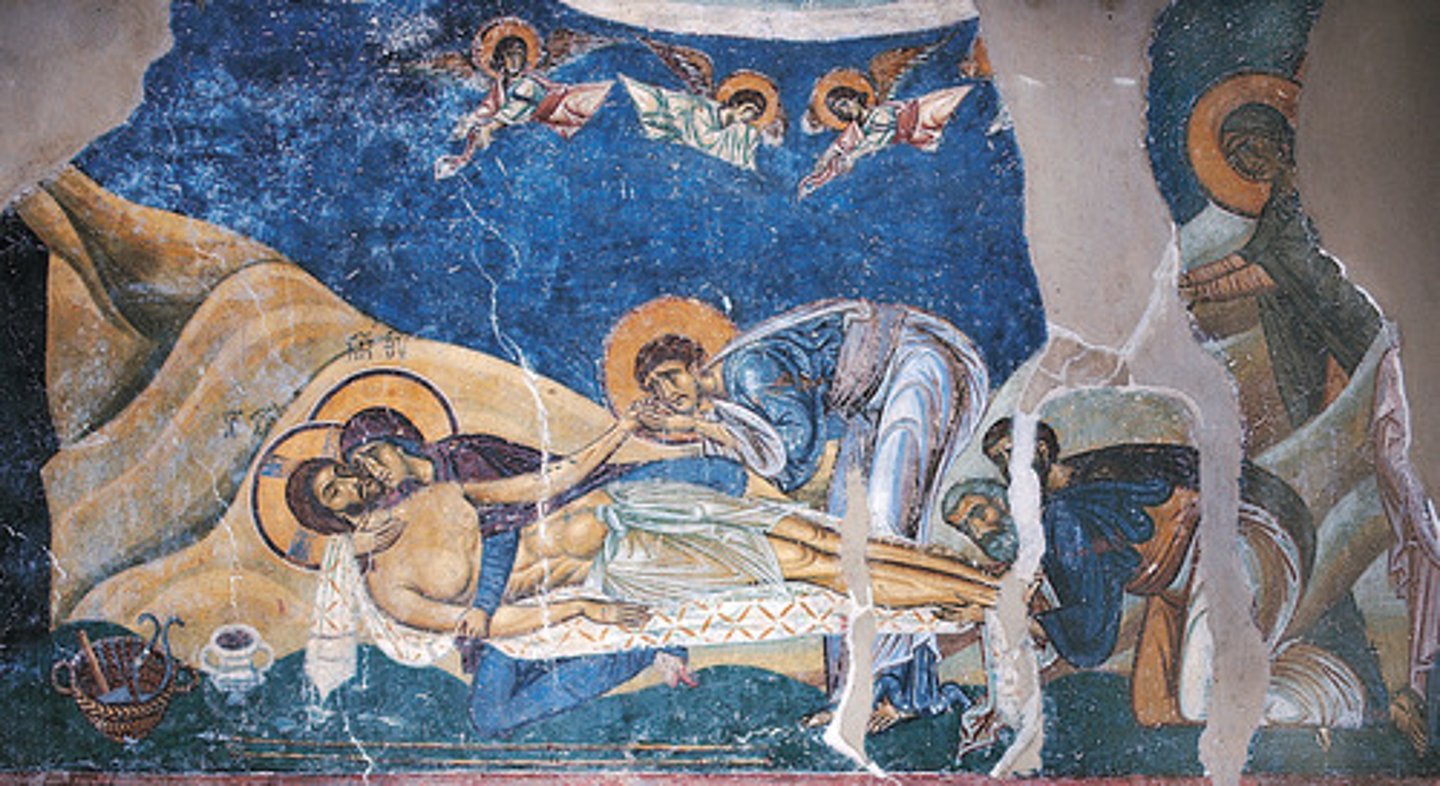
The Dome of the Rock, 7th century CE, Jerusalem. Islamic

Malwiya Minaret, 9th century CE, Great Mosque Iraq. Islamic
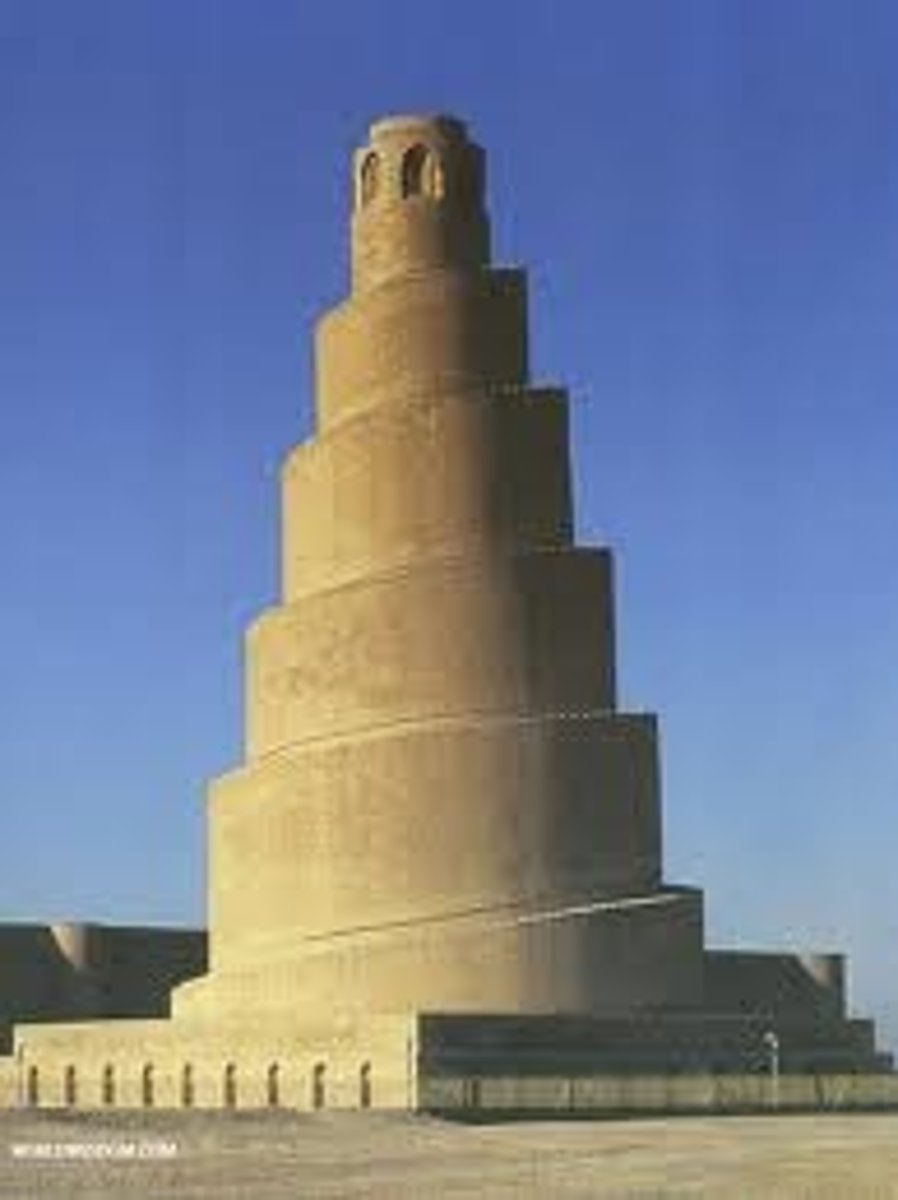
The Great Mosque of Damascus, 8th century CE, Syria. Islamic
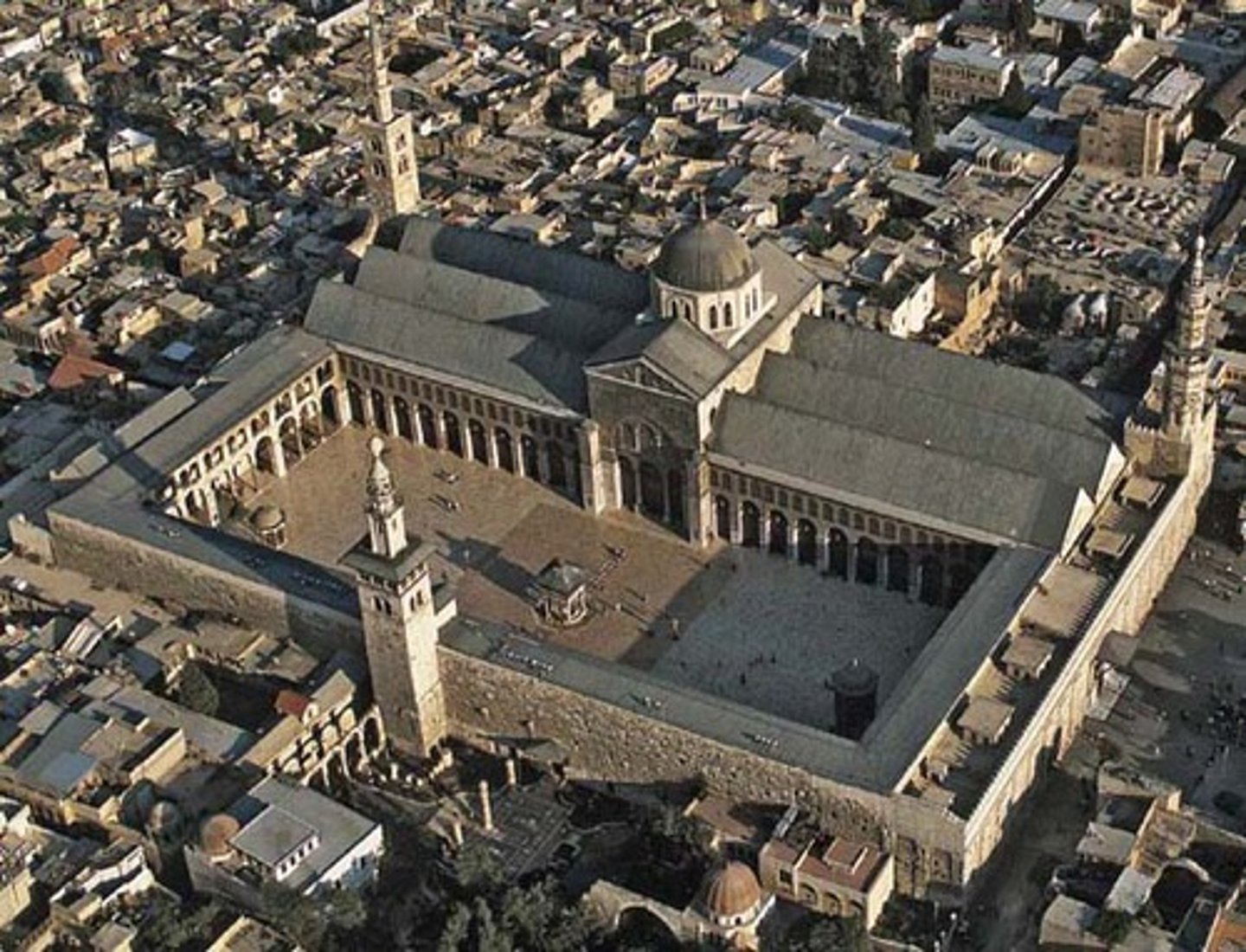
Coronation Mantle for King Roger II, 12th century CE, Italy. Islamic
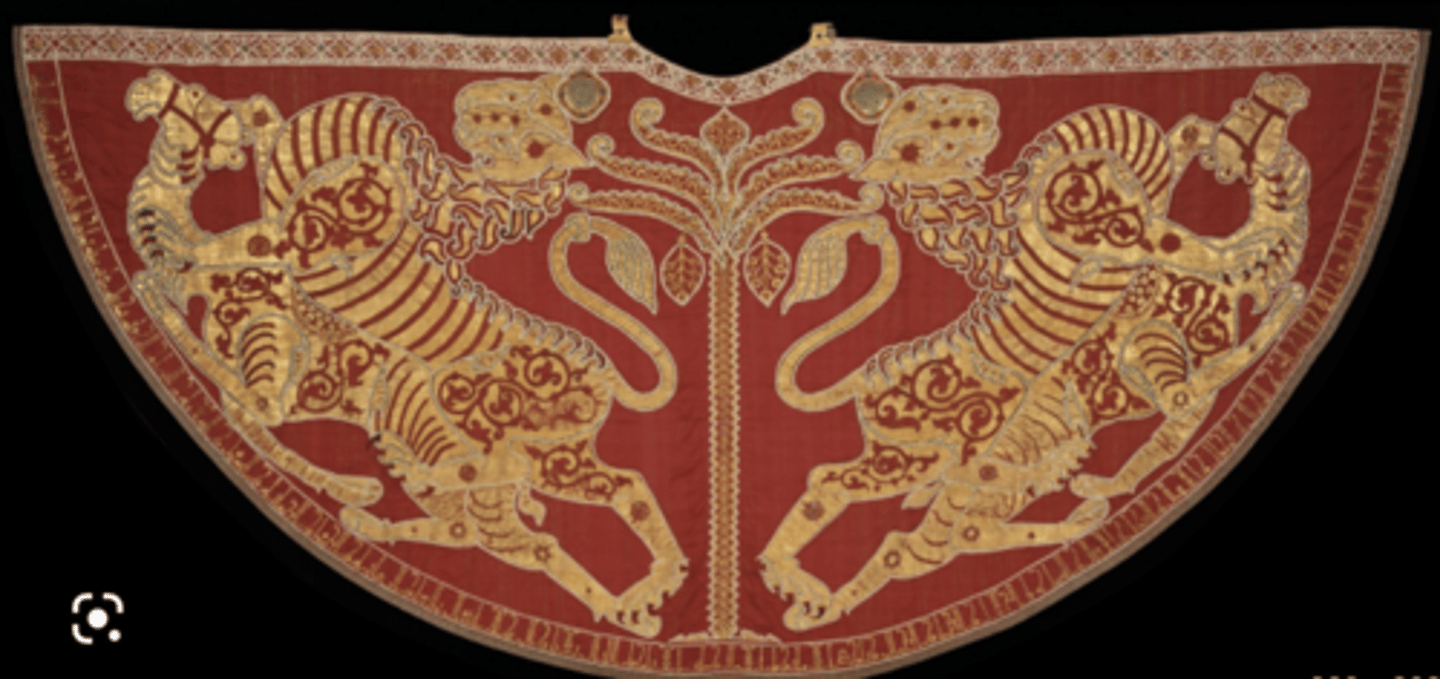
The Pisa Griffin, 11th century CE, Italy. Islamic
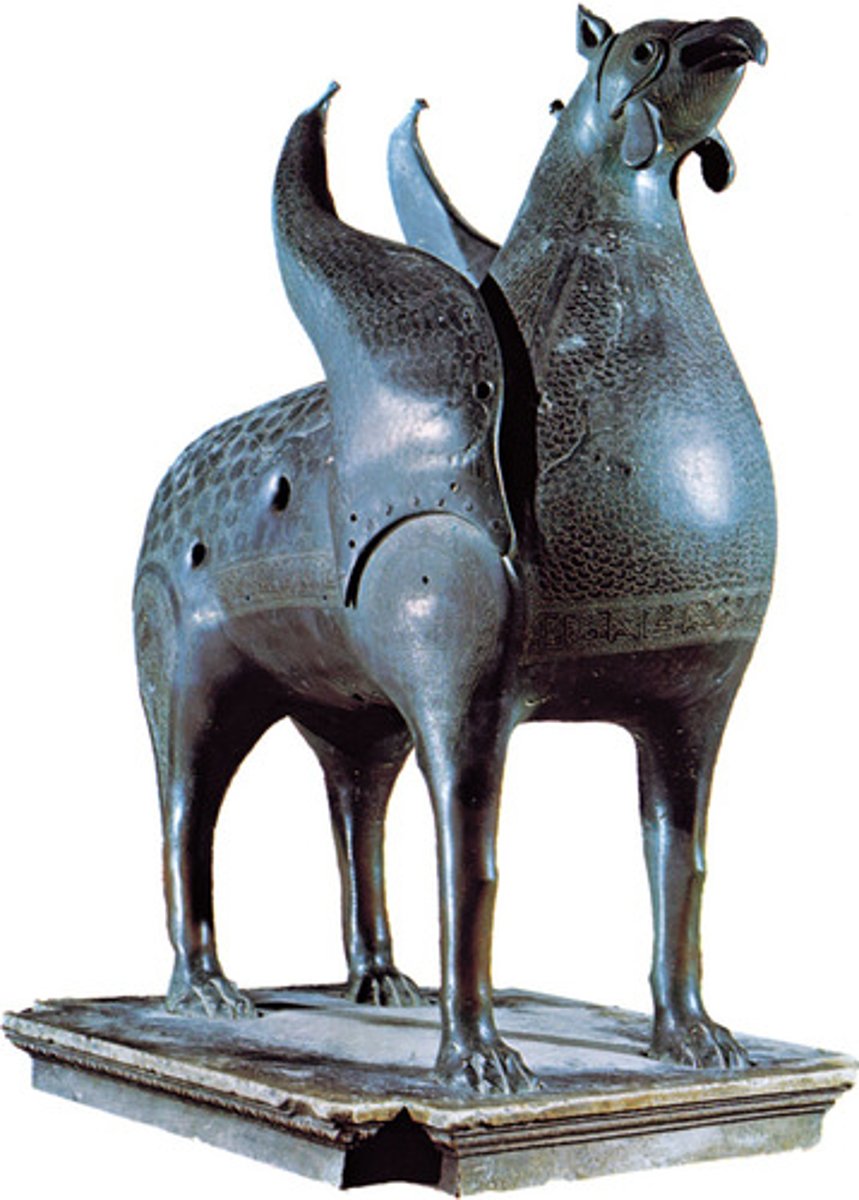
Koran page with surah 18, 9th century CE, Islamic
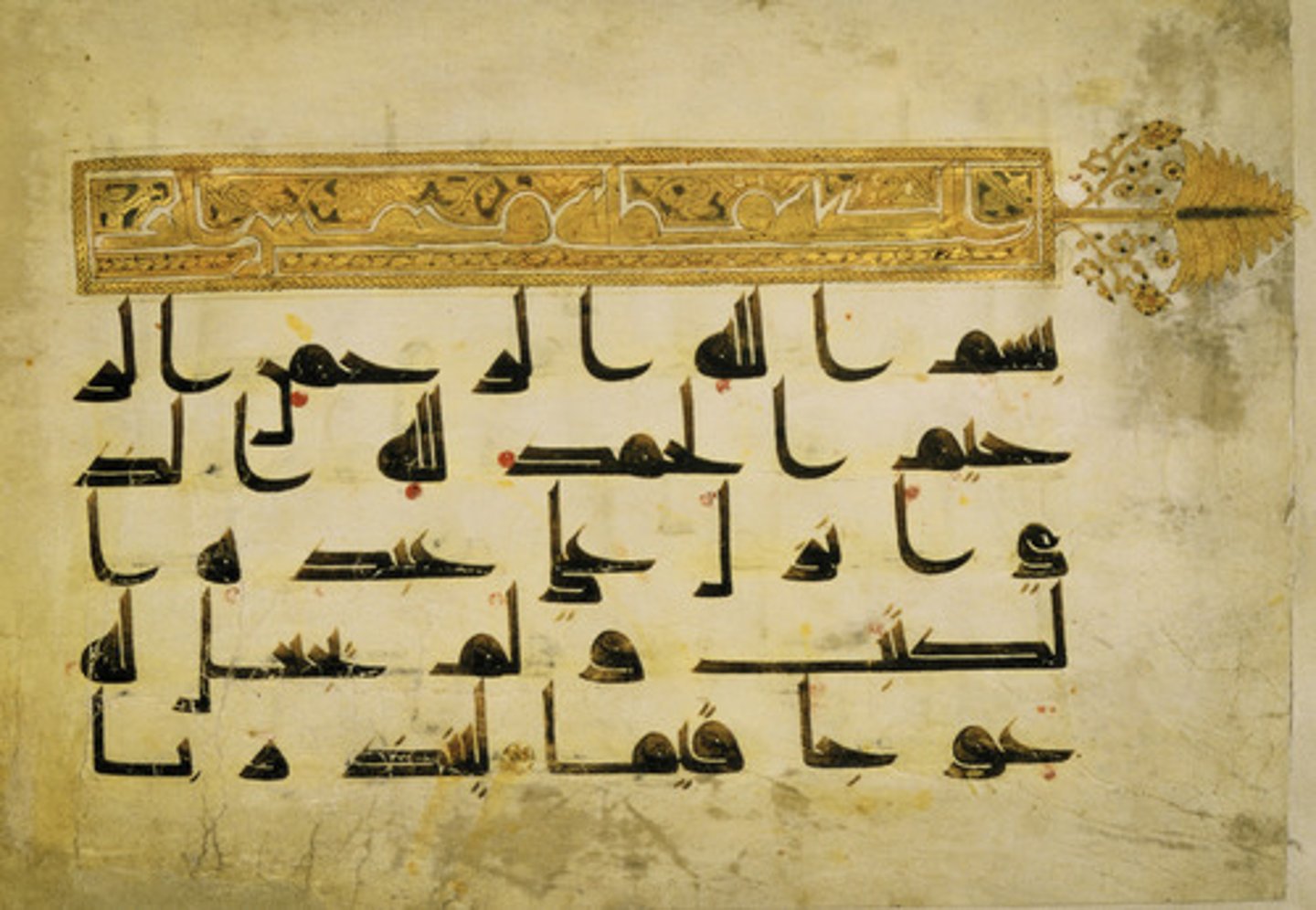
Muqarnas dome, 14th century CE, Palace of the Lions, Spain. Islamic
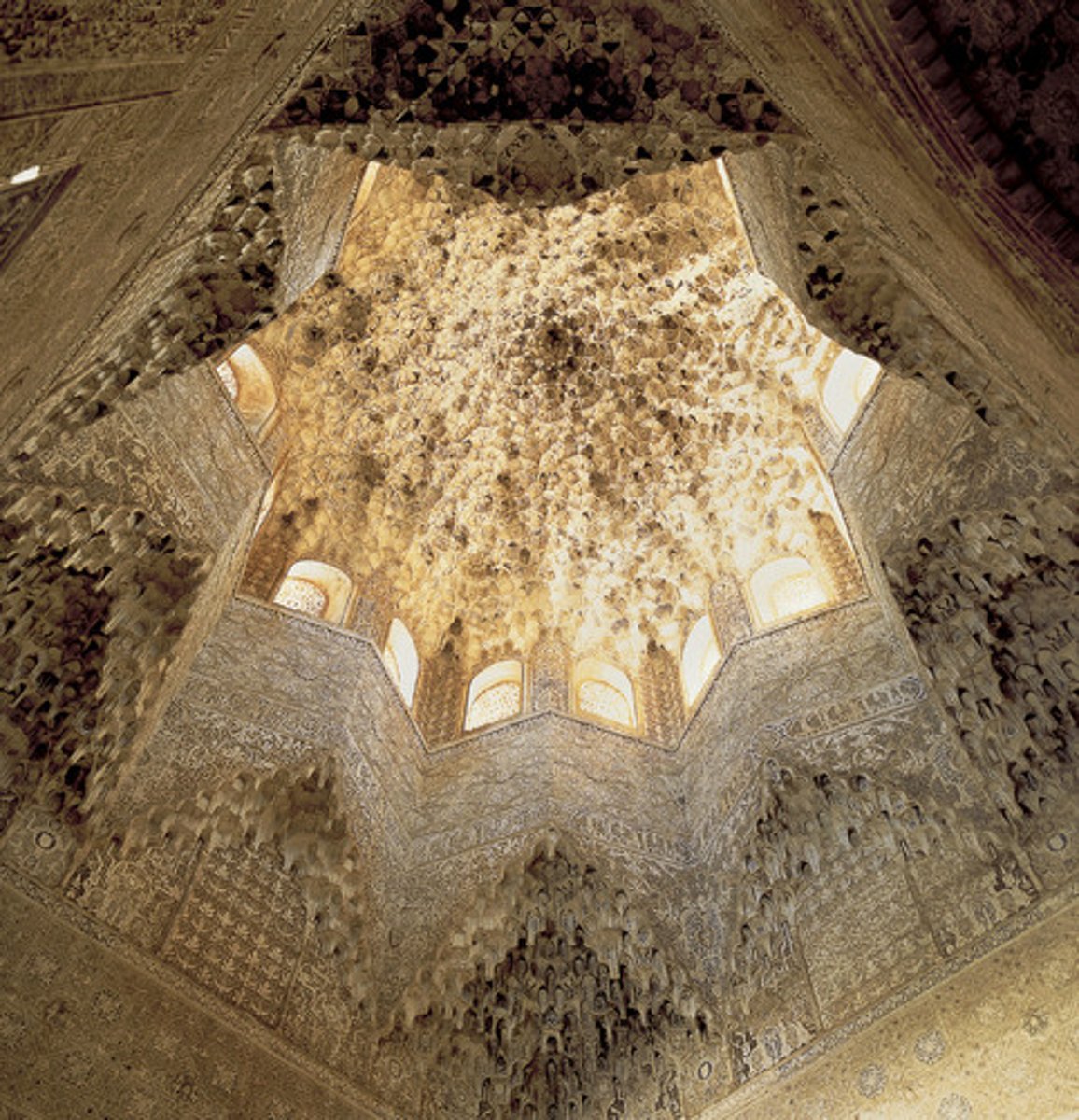
Muqarnas tilework of portal of Imam Mosque, Iran, 17th century CE. Islamic
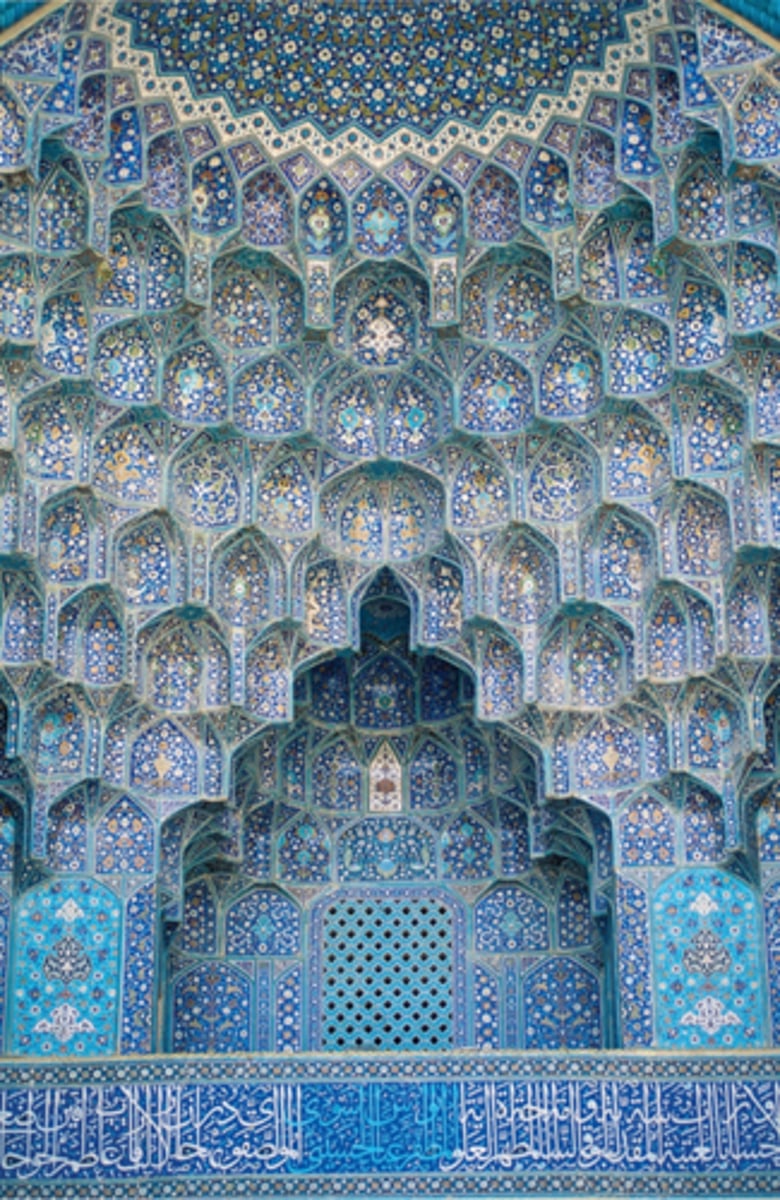
Miharab from the Madrasa Imami, Iran, 14th century CE. Islamic
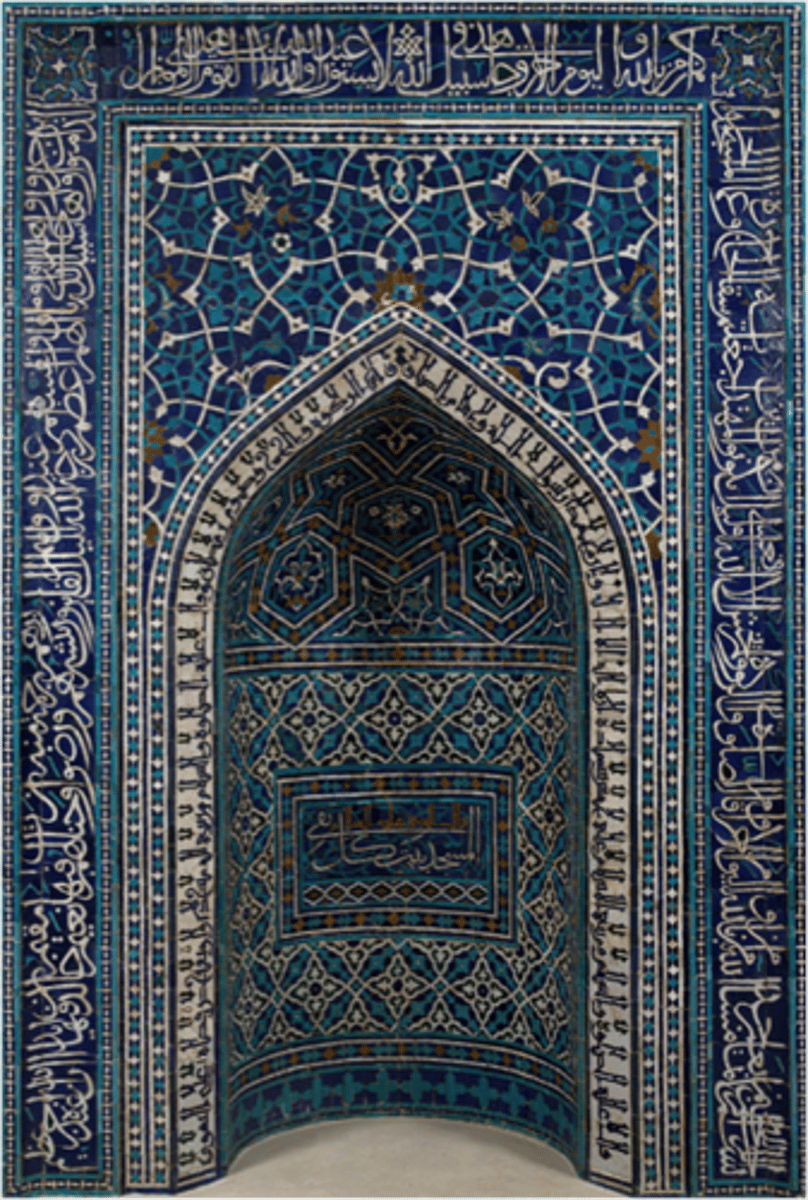
Bihzad, Seduction of Yusuf, folio 52, 15th century CE, Islamic
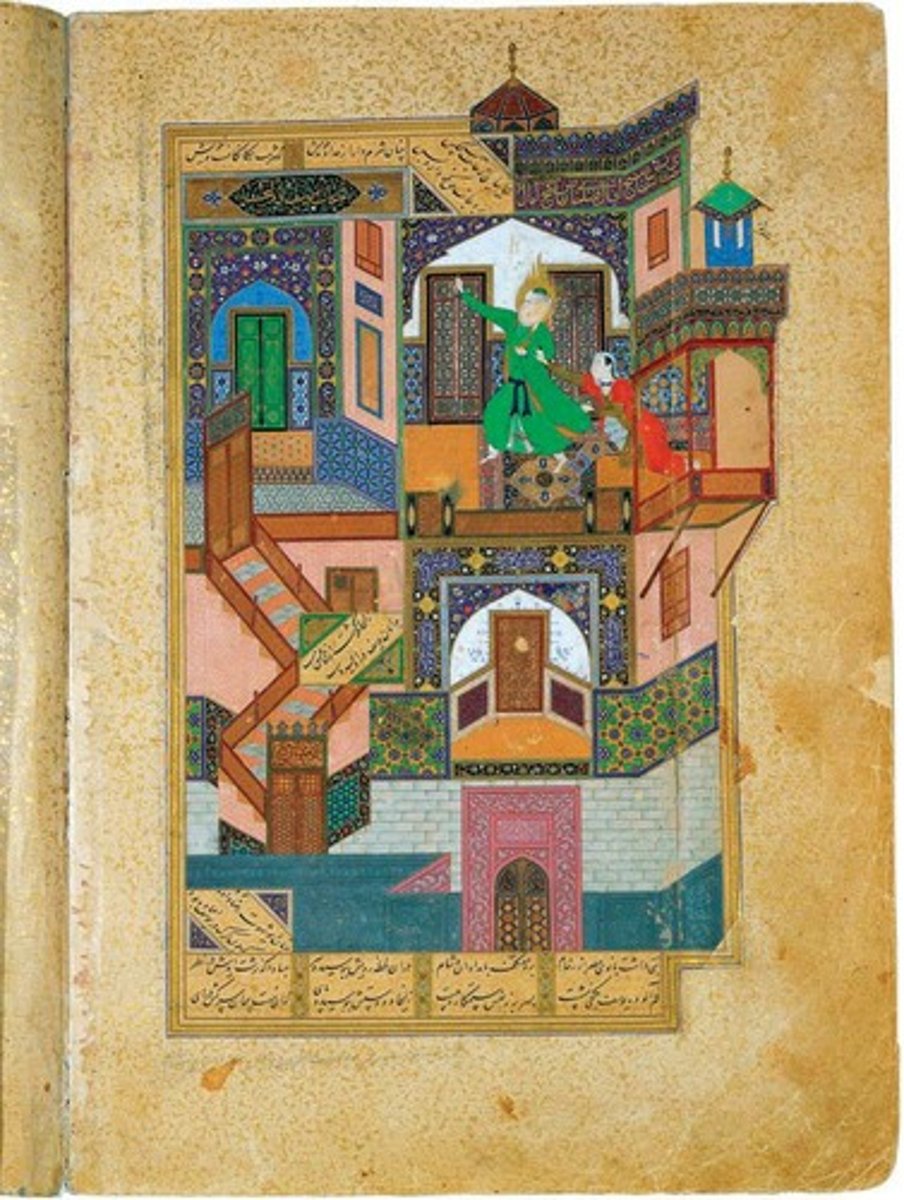
Canteen with episodes of life of Jesus, 13th century CE, Islamic
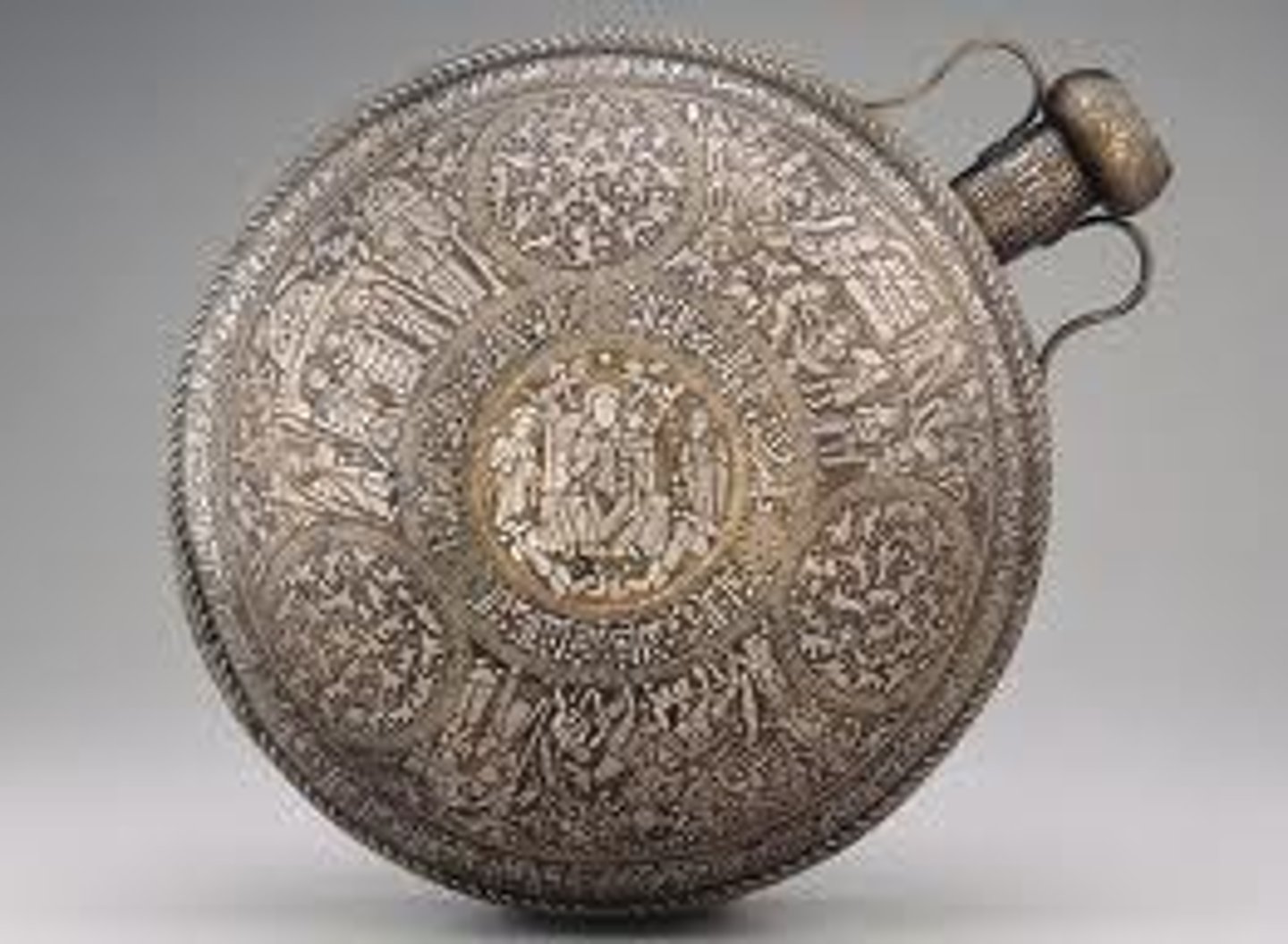
Chi-rho-iota page, Book of Kells, Scotland, 8th century CE, Early Medieval
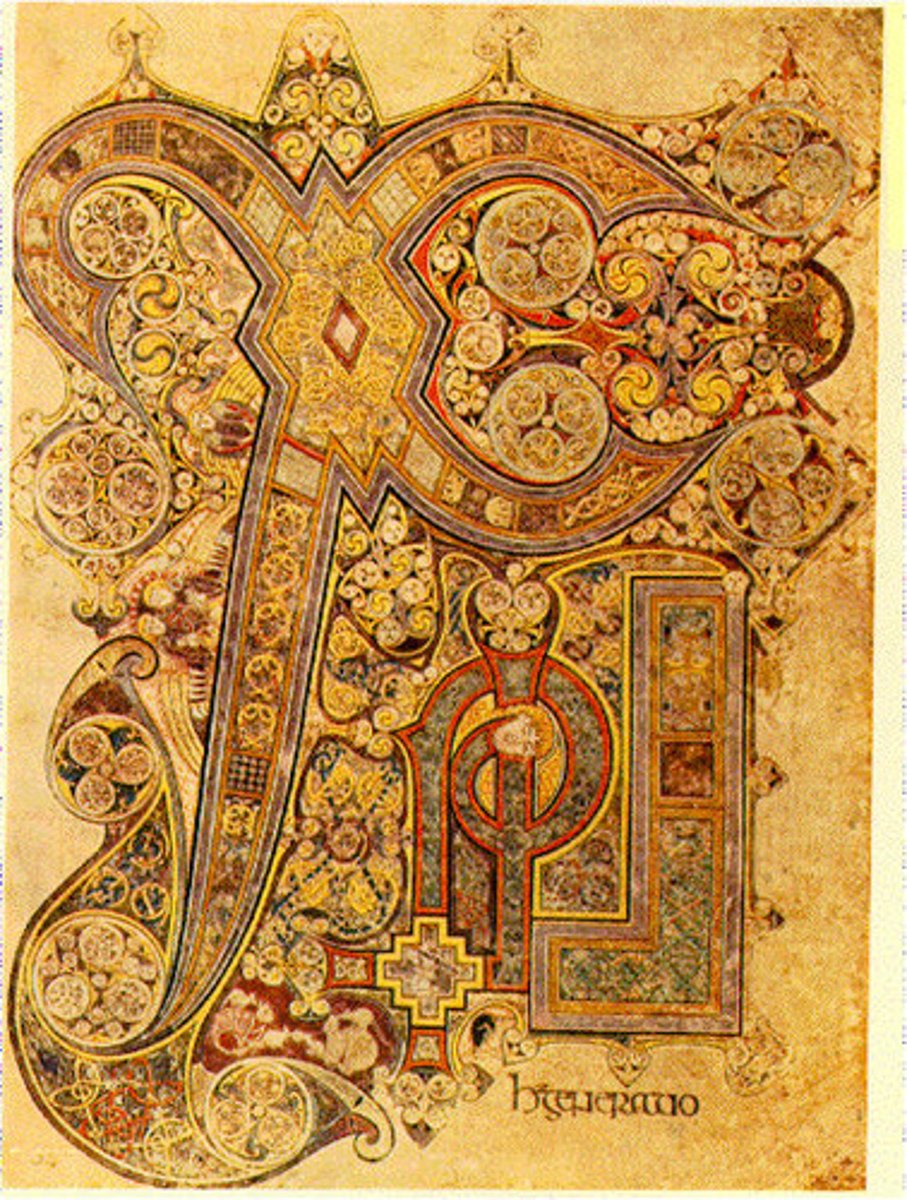
Purse cover from Sutton Hoo ship burial, 7th century CE, England. Early Medieval
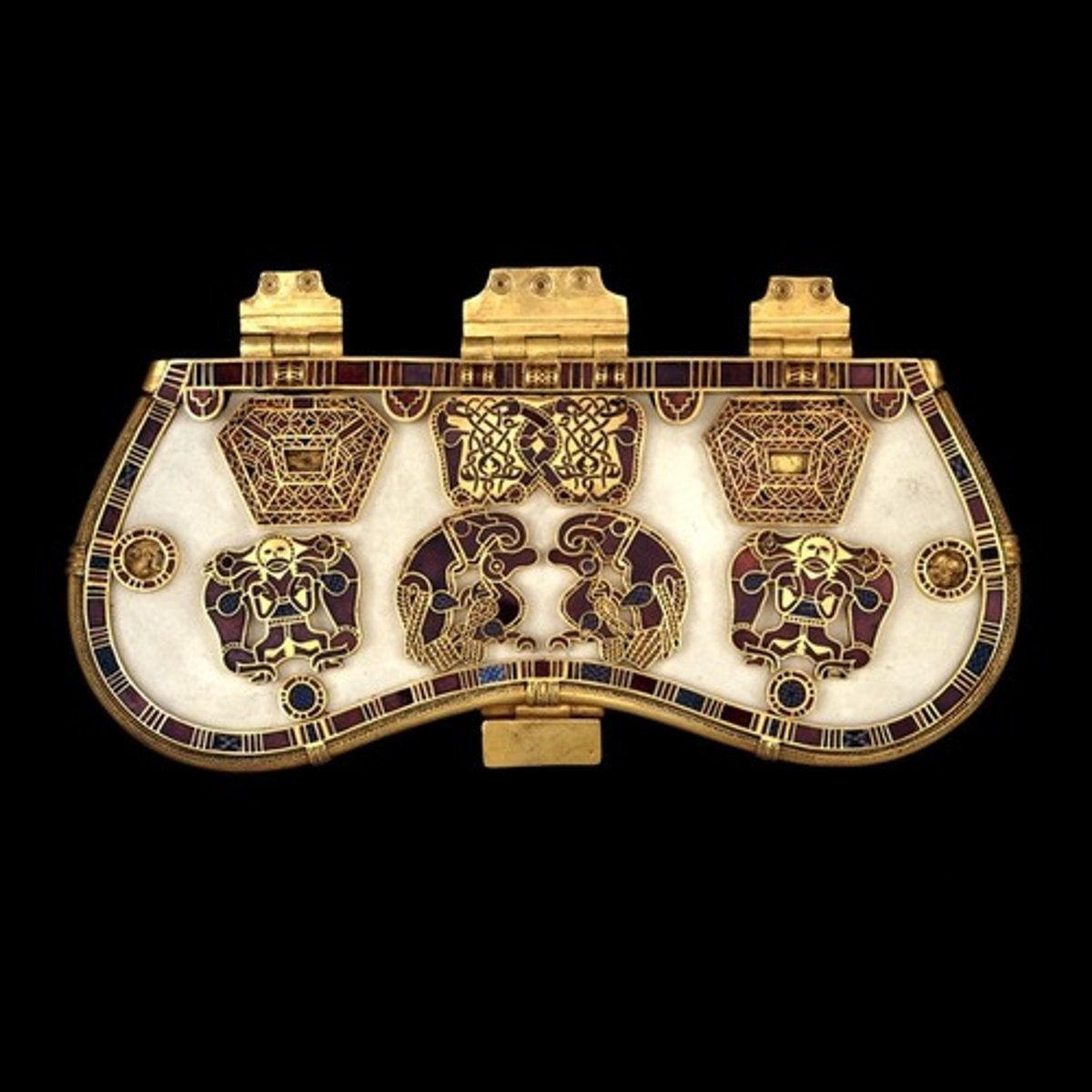
Belt buckle from Sutton Hoo ship burial, 7th century CE, Early Medieval
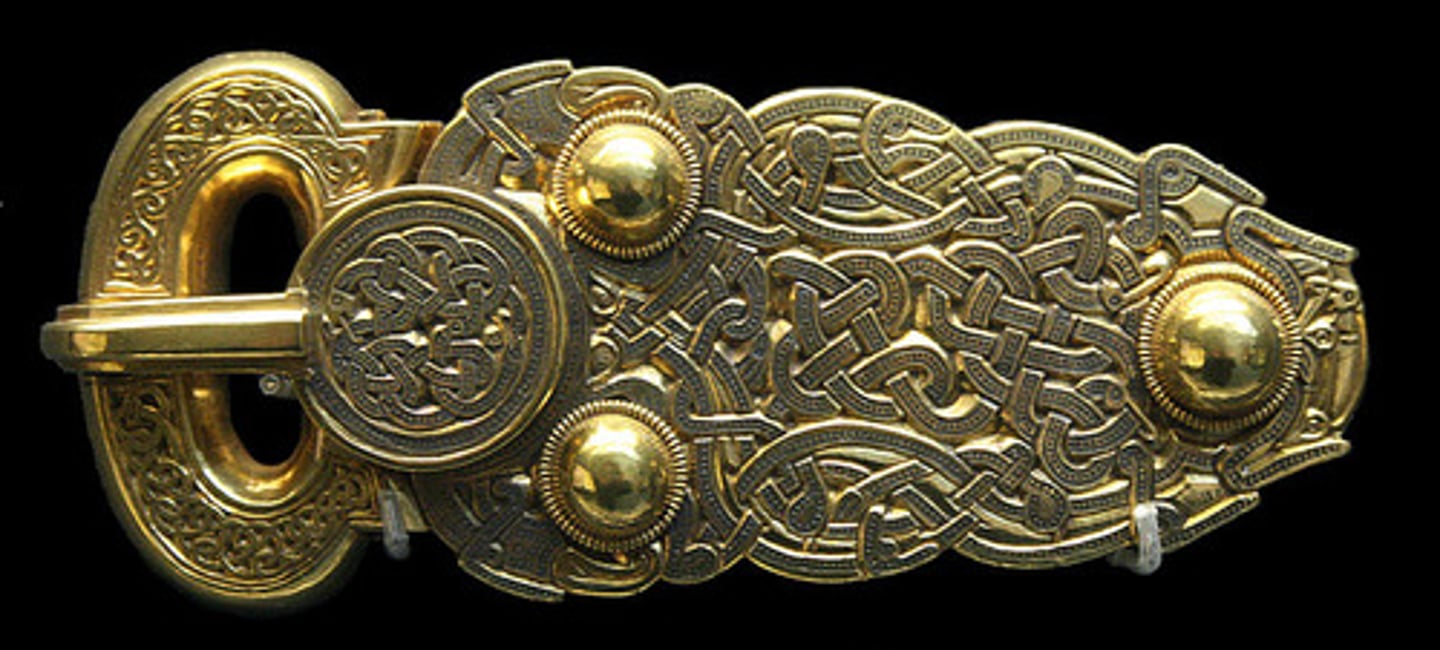
Cross inscribed carpet, folio 26, Lindisfarne Gospels, 7th century CE, Early Medieval
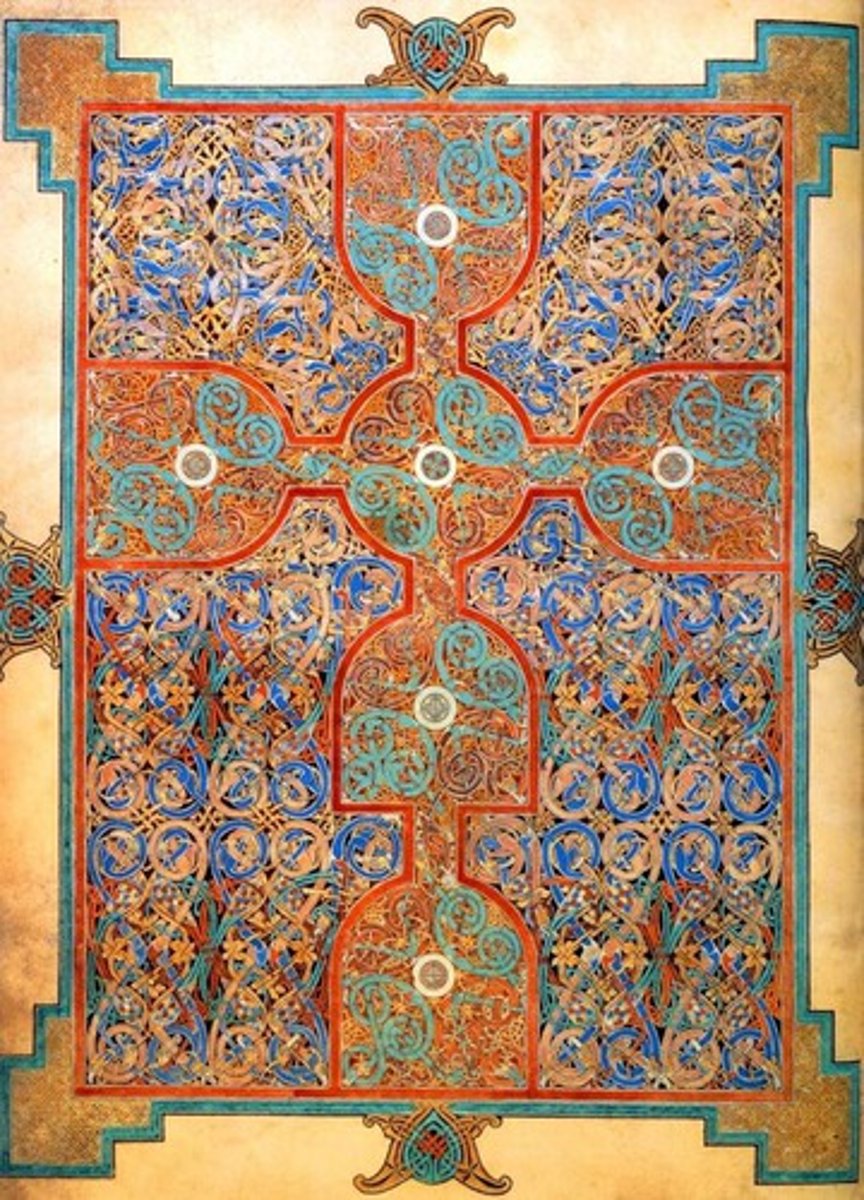
Equestrian portrait of Charlemagne, 9th century CE, Italy. Early Medieval
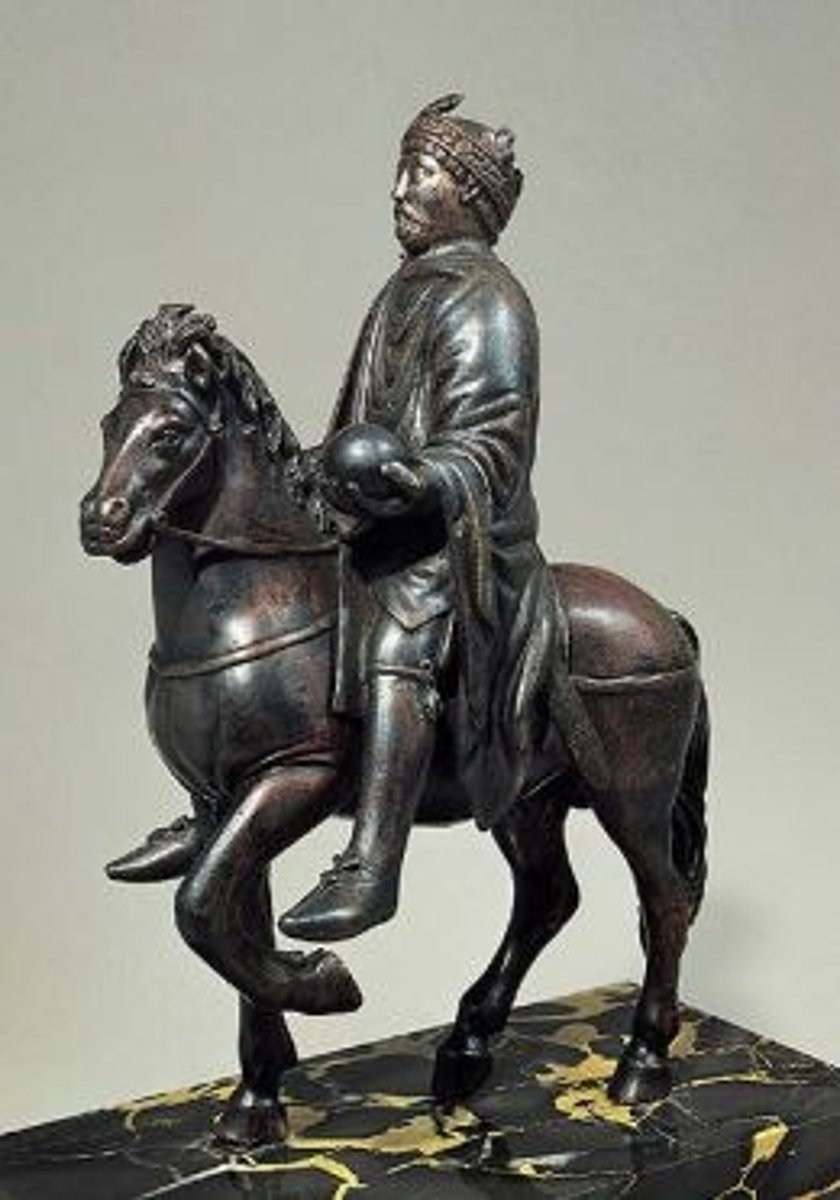
Saint Matthew, Coronation Gospels, folio 18, 9th century CE, Germany. Early Medieval
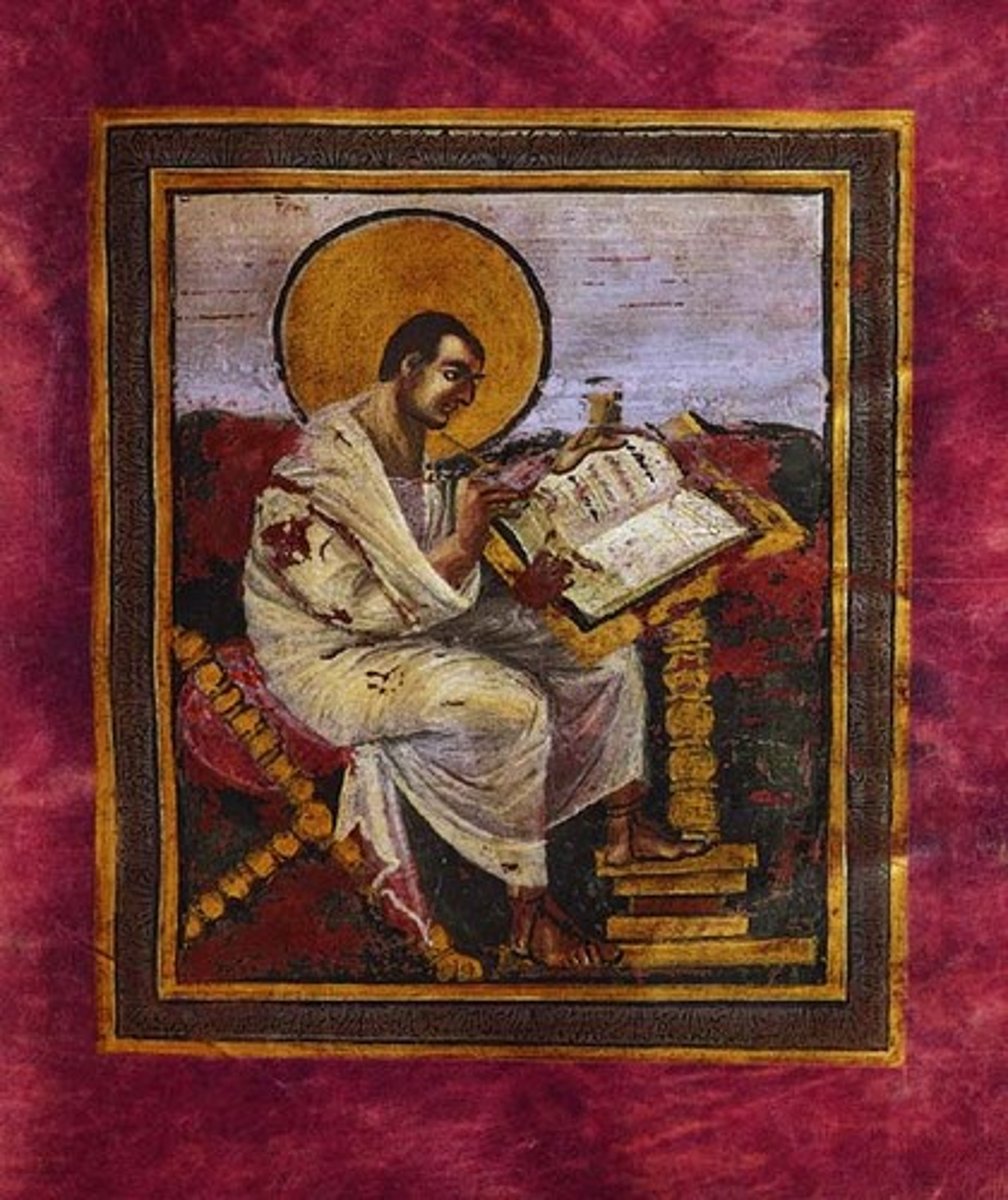
Saint Matthew, Ebbo Gospels, 9th century CE, France. Early Medieval
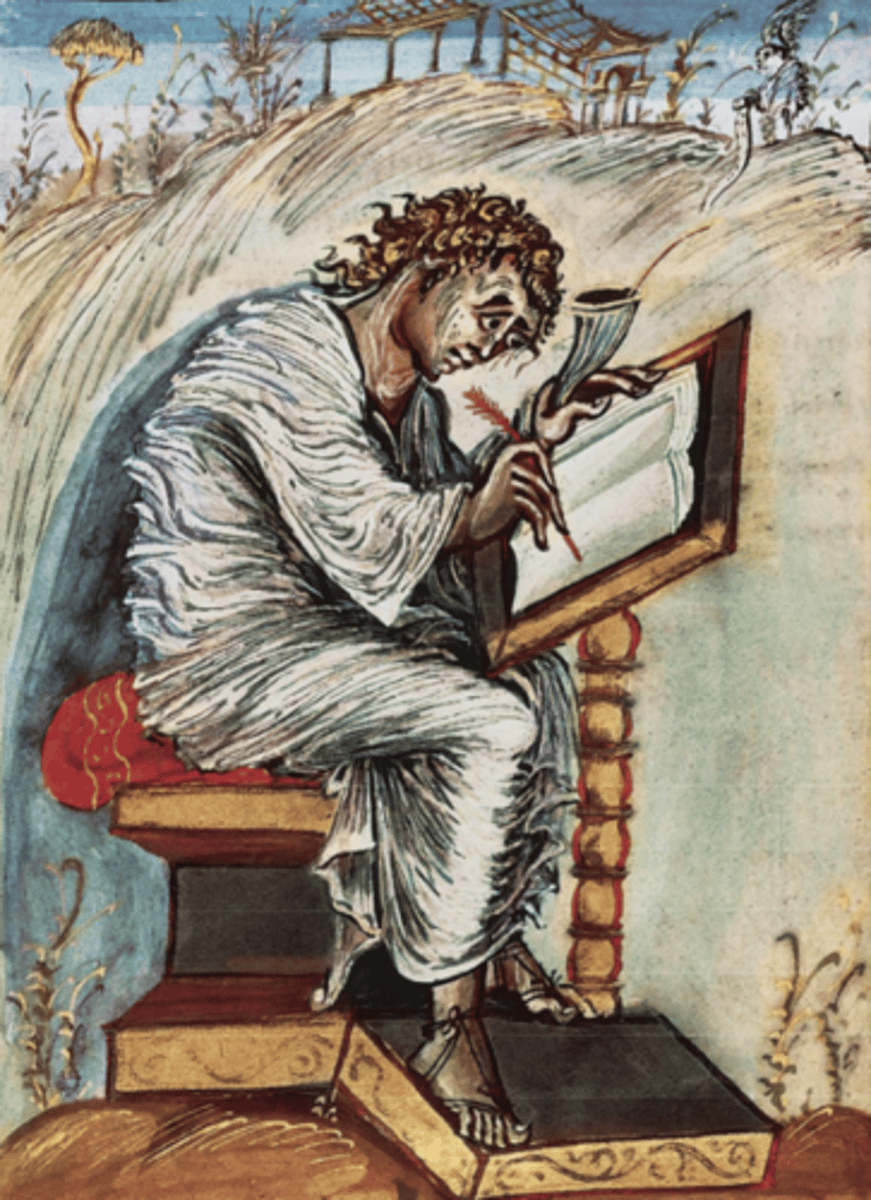
Crucifixion cover of Lindau Gospels, 9th century CE, Switzerland. Early Medieval
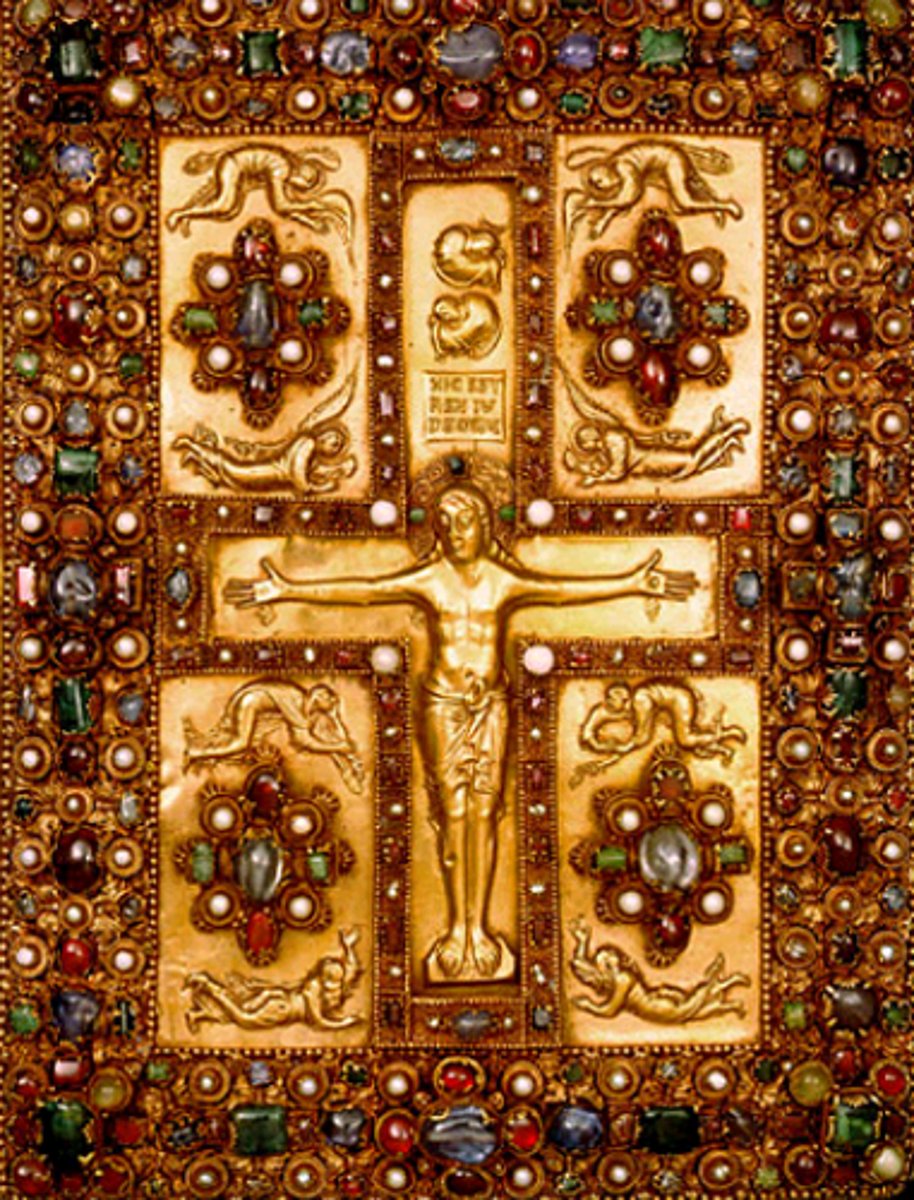
Virgin & Child, 14th century CE, Notre Dame Cathedral, France. Gothic
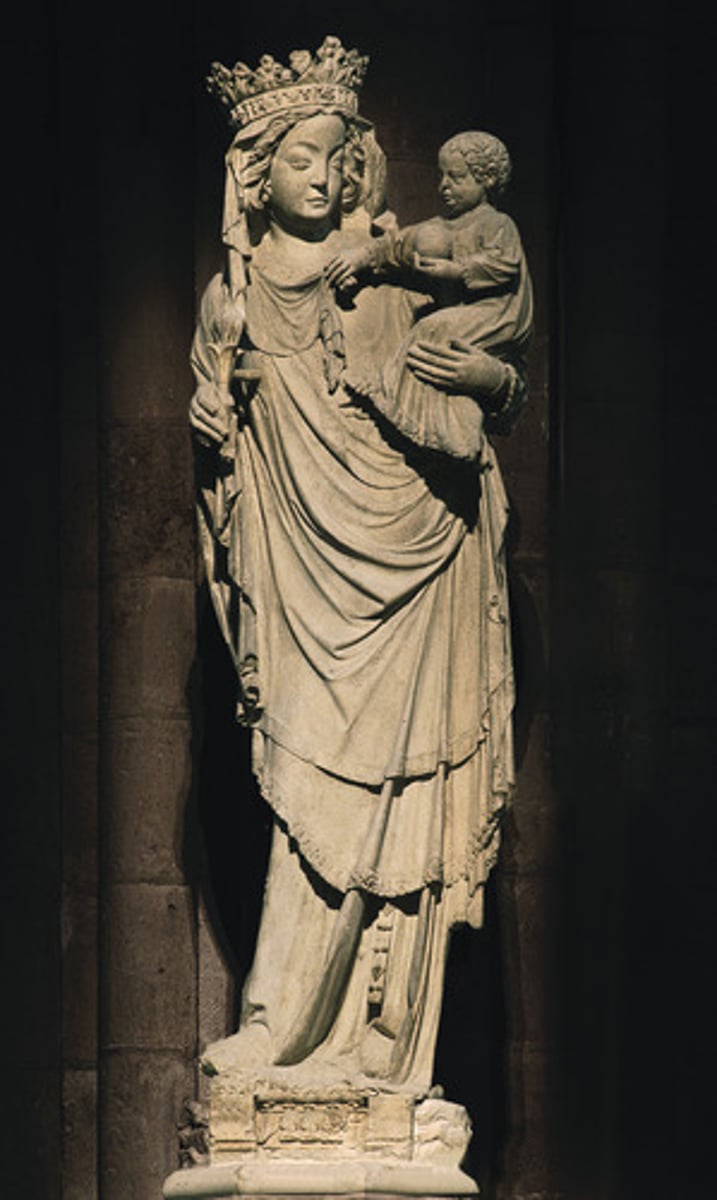
Virgin of Jeanne d'Evreux, Saint Denis, 14th century CE. Gothic
LUXURY ITEM
Holds a relic
Christ child holds a pomegranate the symbol of resurrection
Tender sense of engagement with the Christ child
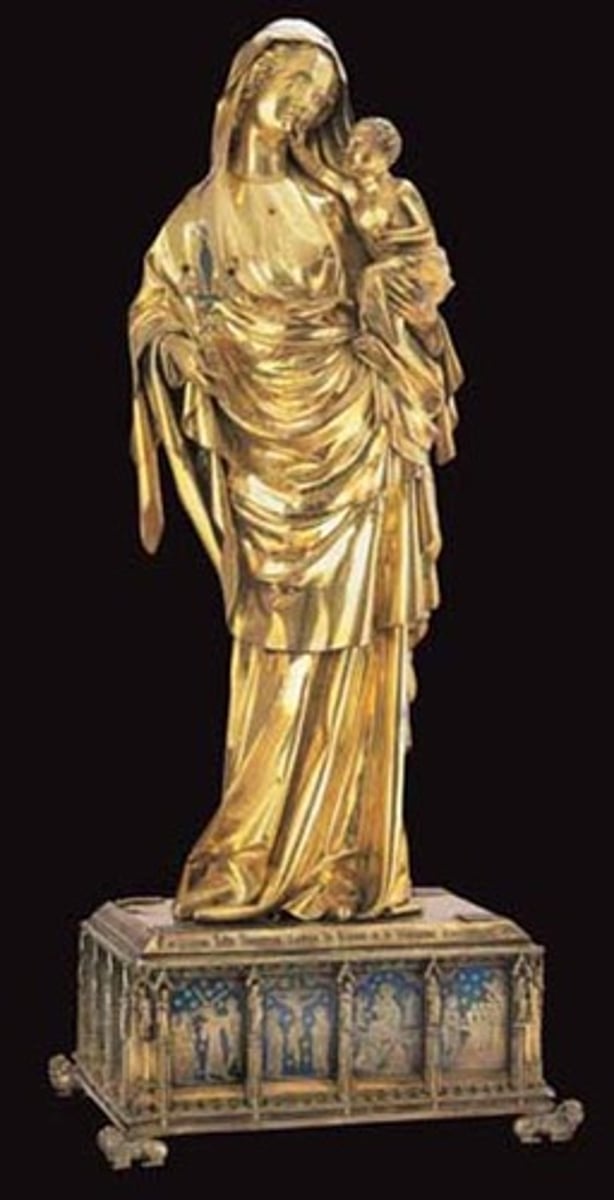
Castle of Love, 14th century CE, Paris. Gothic
Secular theme of love
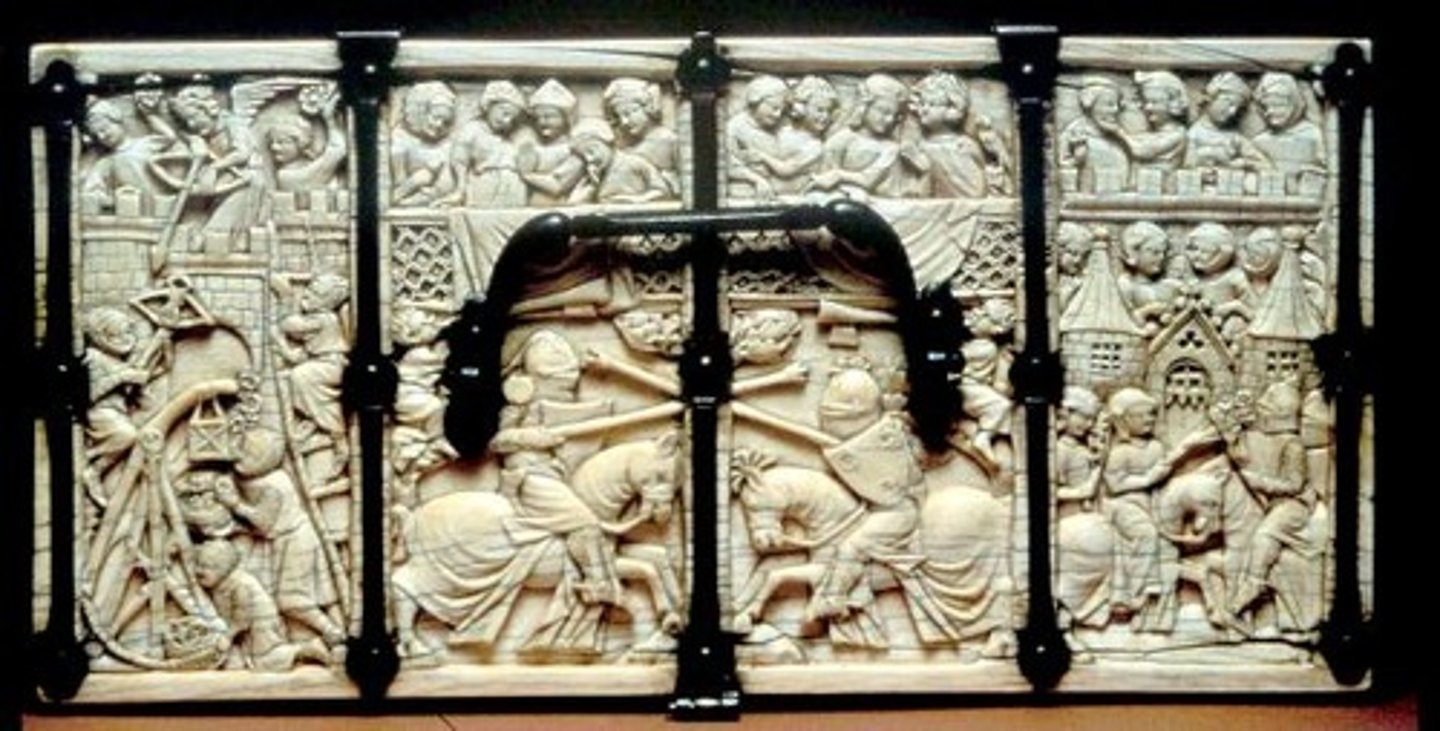
Nicola, Pulpit of Baptistery, 13th century CE, Italy. Late Medieval
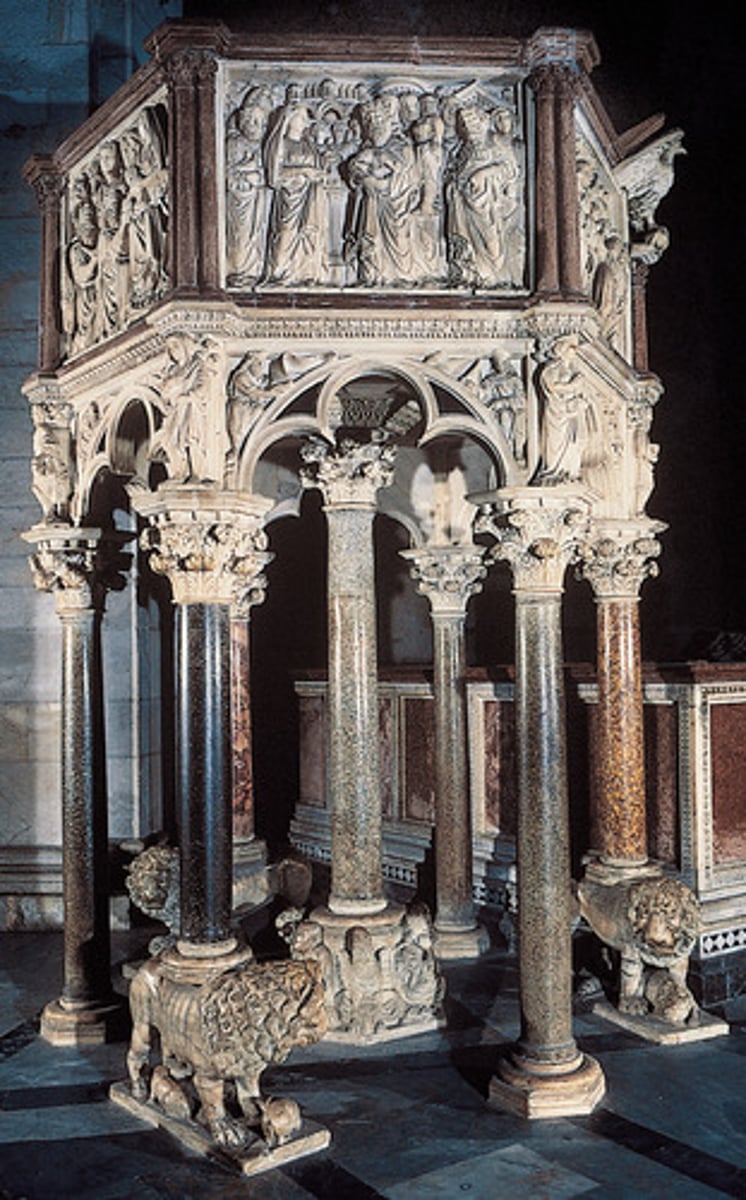
Giovanni, Nativity and Annunciation, 14th century CE, Italy. Late Medieval Italy
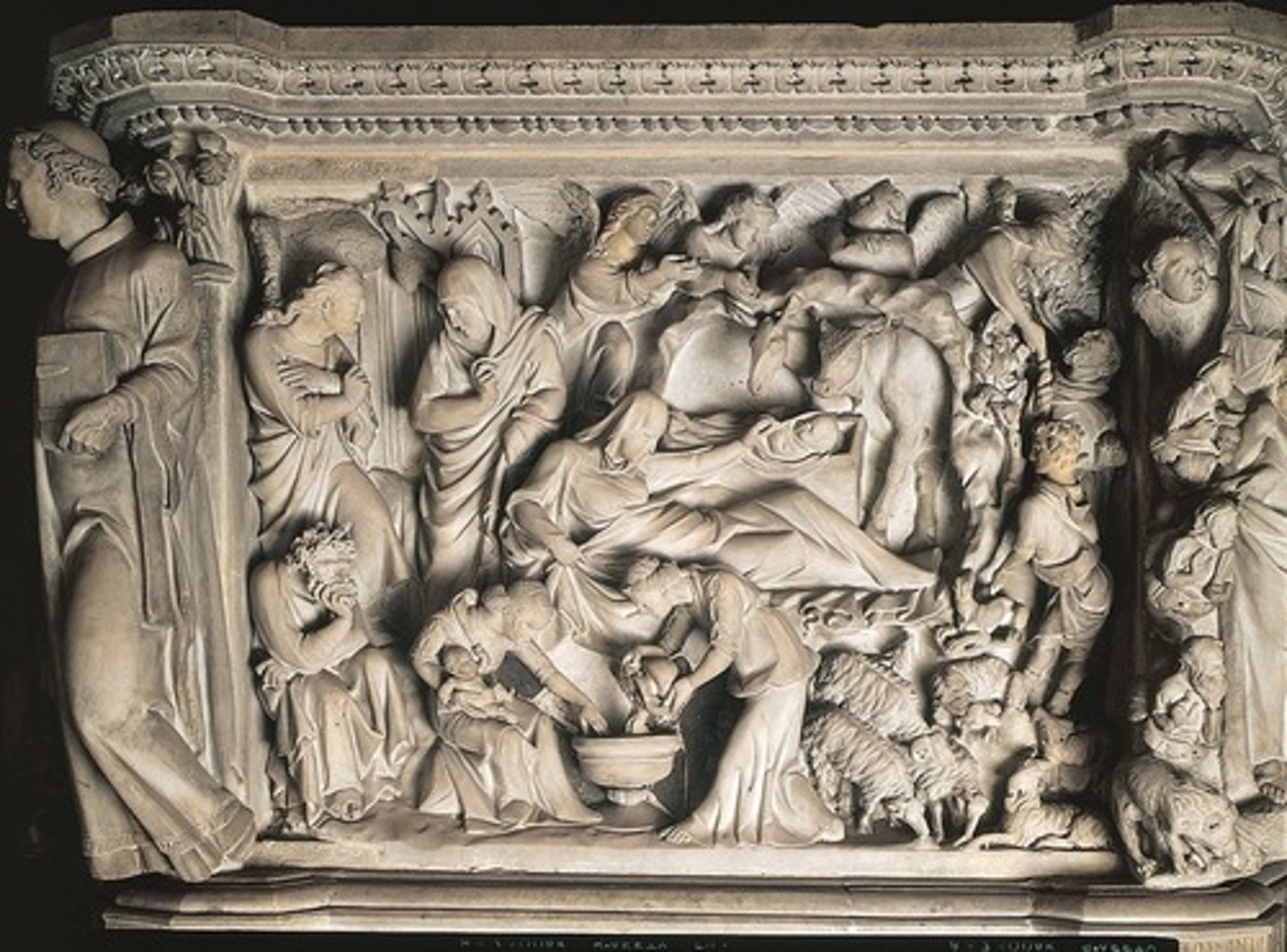
Bonaventura Berlinghieri, Saint Francis, The Church of San Francesco, Italy,13th century CE. Late Medieval
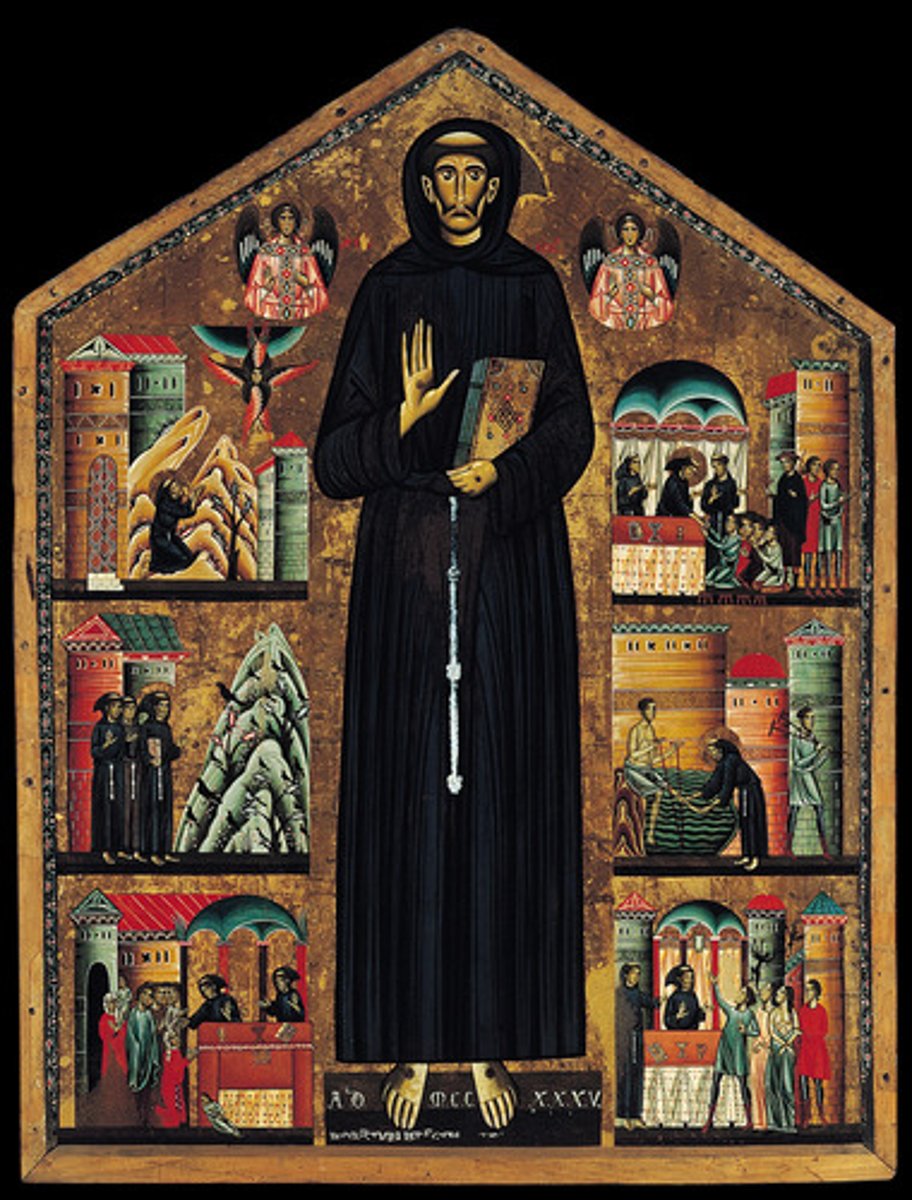
Cimabue, Madonna Enthroned with Angels, 13th century CE, Italy. Late Medieval
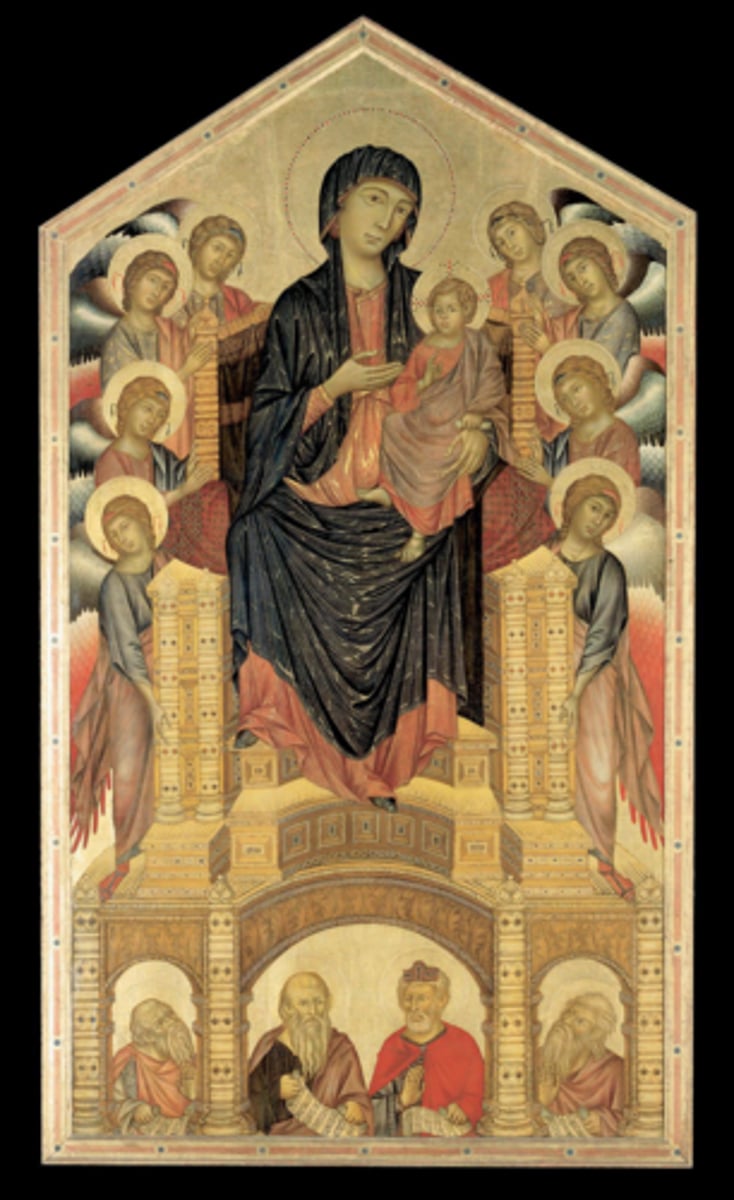
Pietro Cavallin, Christ Flanked by Angels, 13th century CE, Rome, Italy. Late Medieval Italy
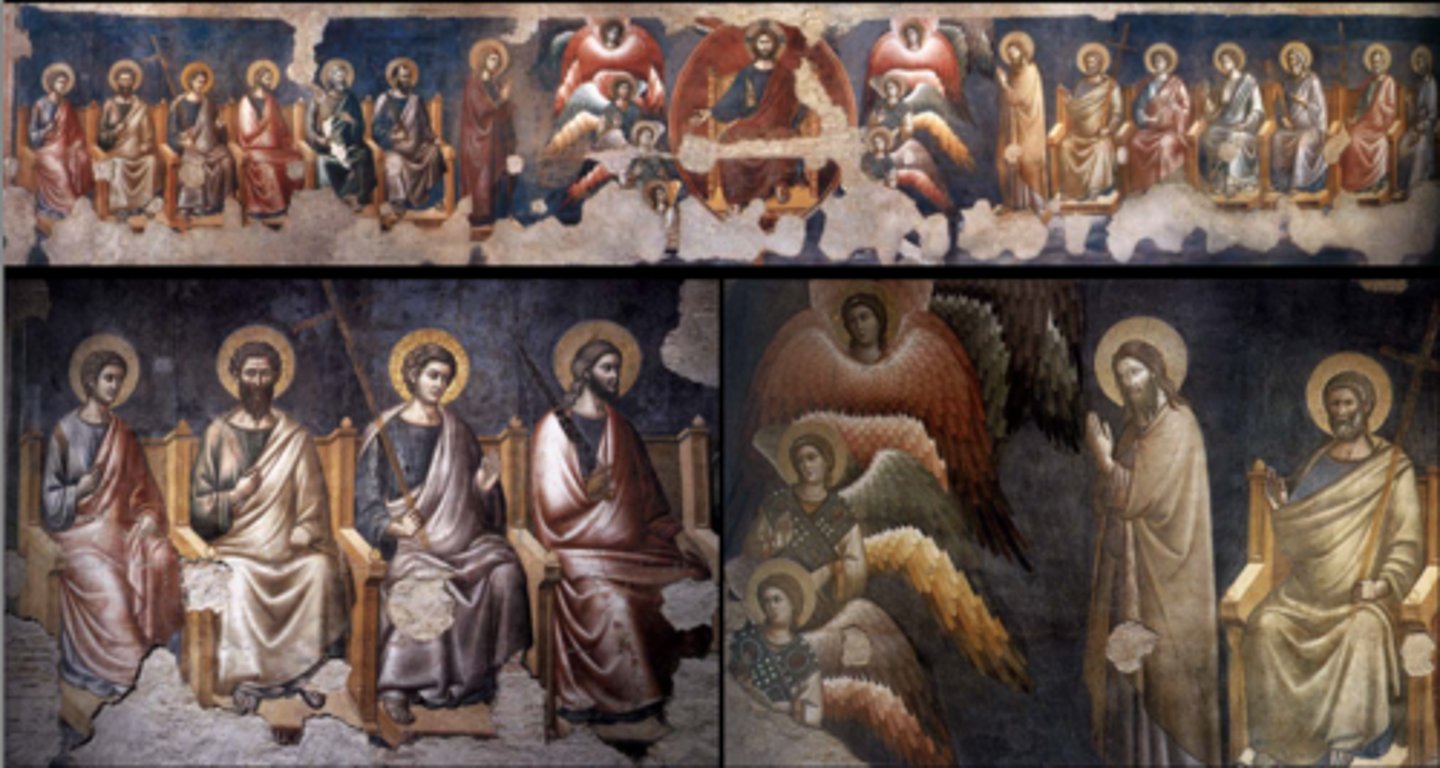
Giotto di Bondone, Madonna Enthroned, 14th century CE, Italy. Late Medieval
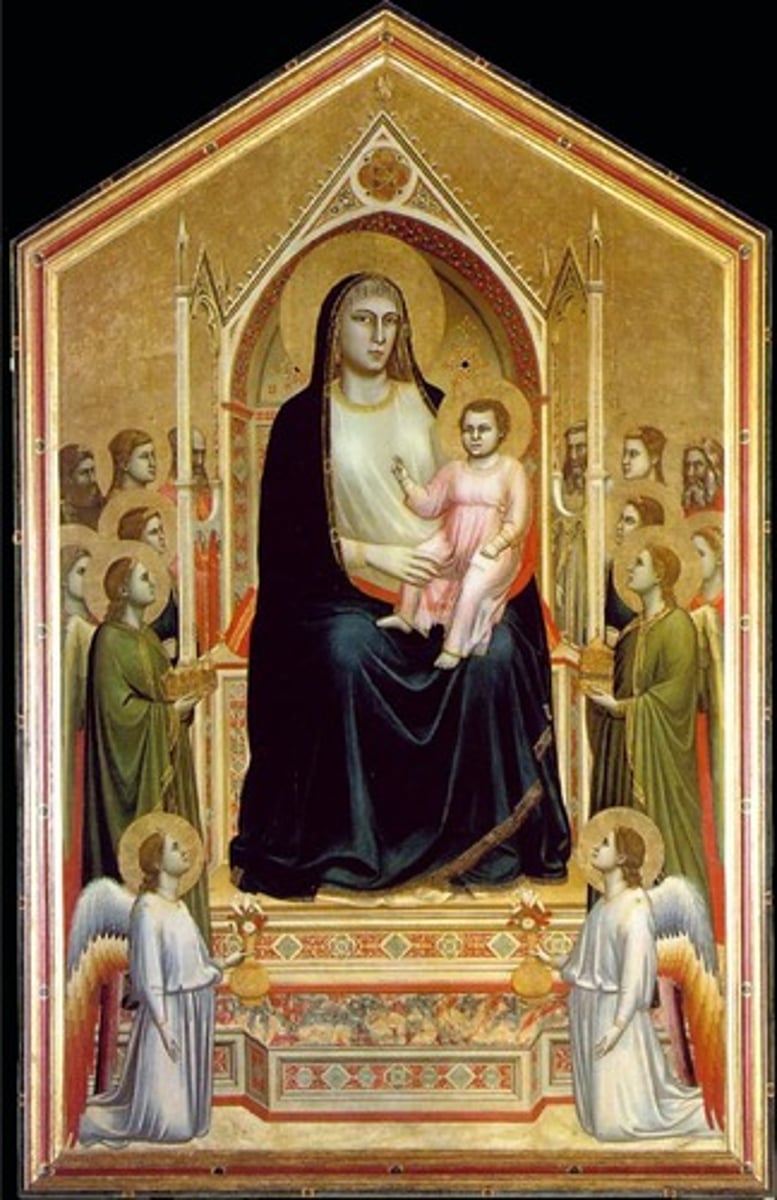
Giotto paintings, Arena Chapel, 14th century CE, Italy. Late Medieval
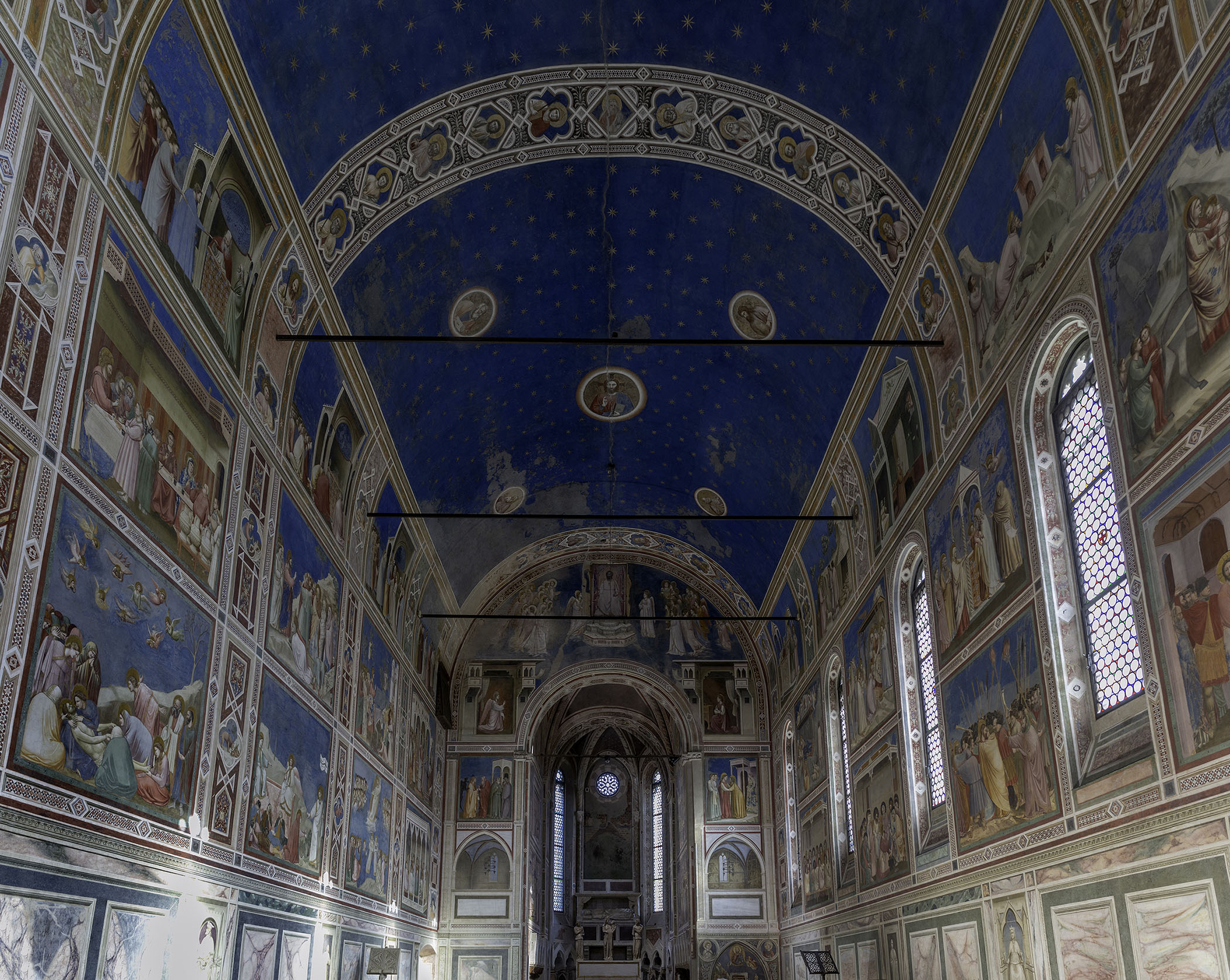
Duccio di Buoninsegna, Maesta paintings, 14th century CE, Italy. Late Medieval
Example of a polyptych (many panels)
Only privileged individuals would be able to read the back of the altarpiece
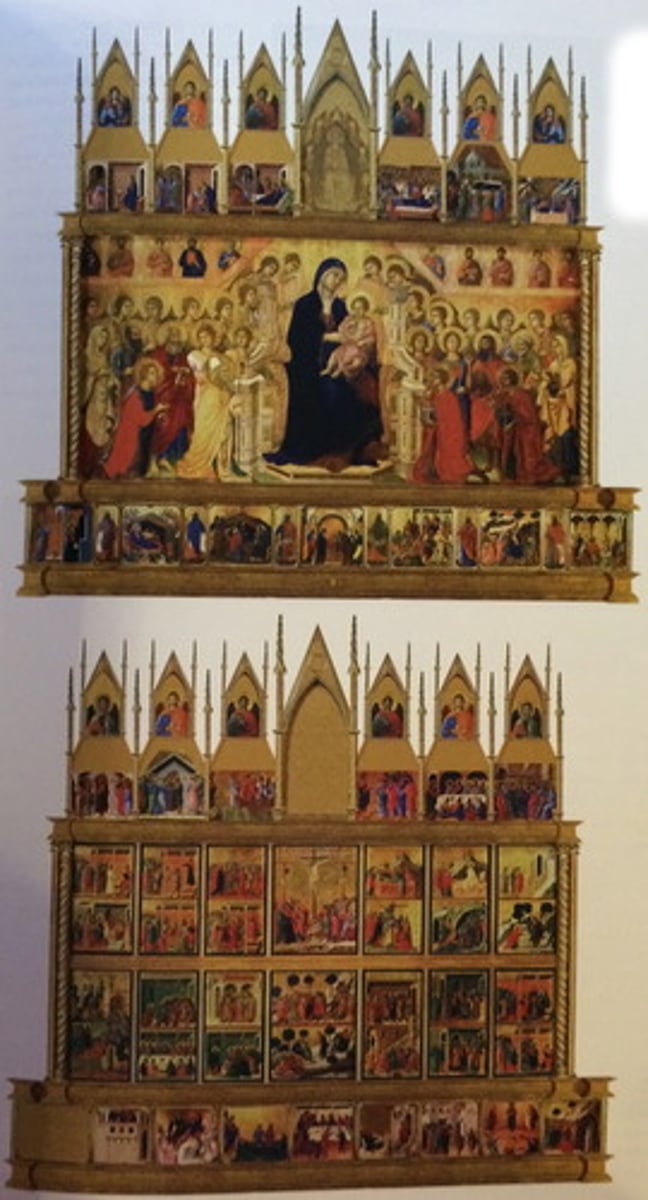
Simone Martini and Lippo Memmi, Annunciation, 14th century CE, Italy. Late Medieval
Columns that are fundamental to the altarpiece are used as walls to divide the scenes
Pictorial realism - shows an upper-class home
Spatial illusionism
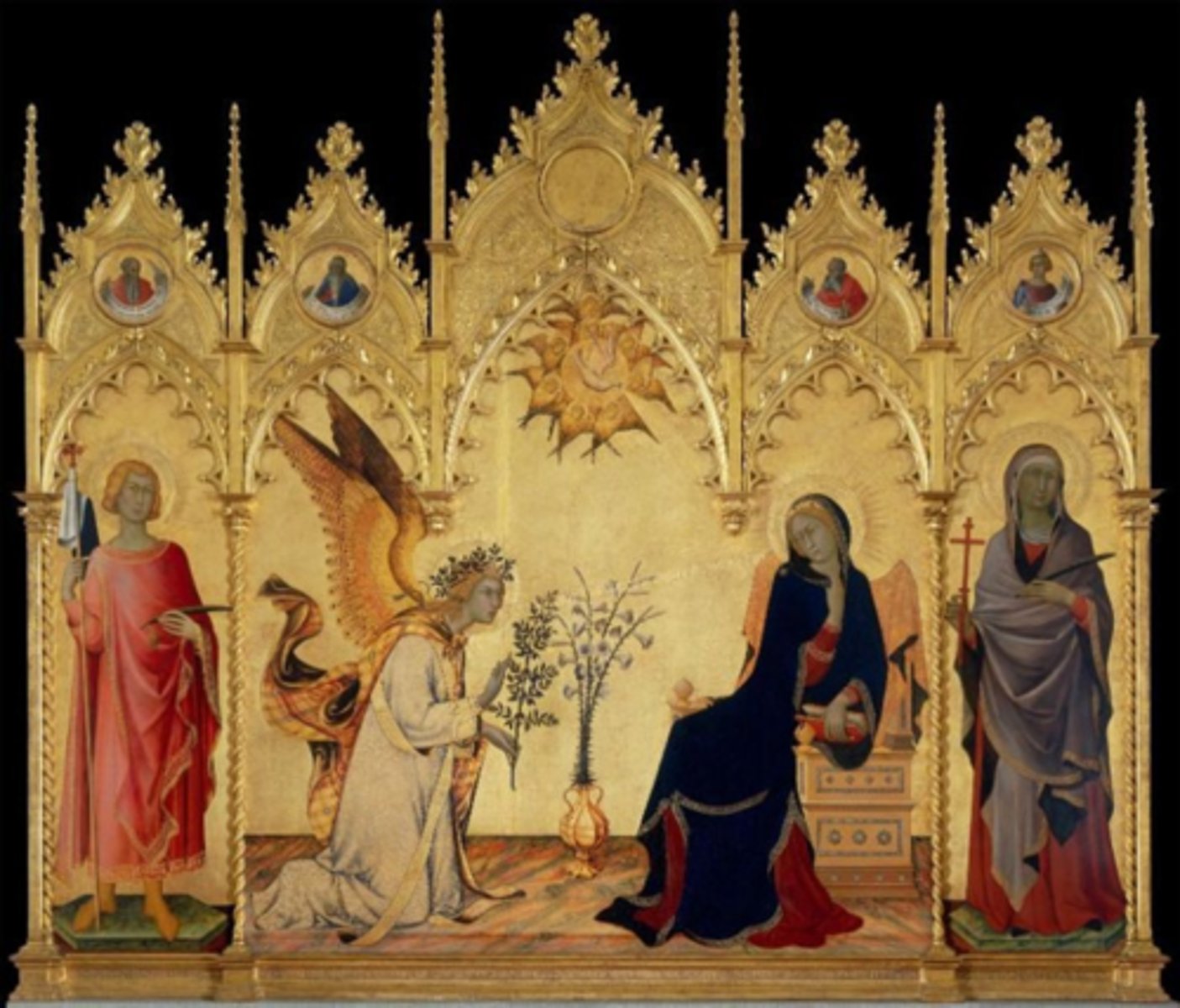
Palazzo Pubblico, 13th century CE, Italy. Late Medieval
Fortress-like, tower used for defensive purposes
Concave plan to fit the piazza
Allegorical paintings of good and bad government— city-states vying for power
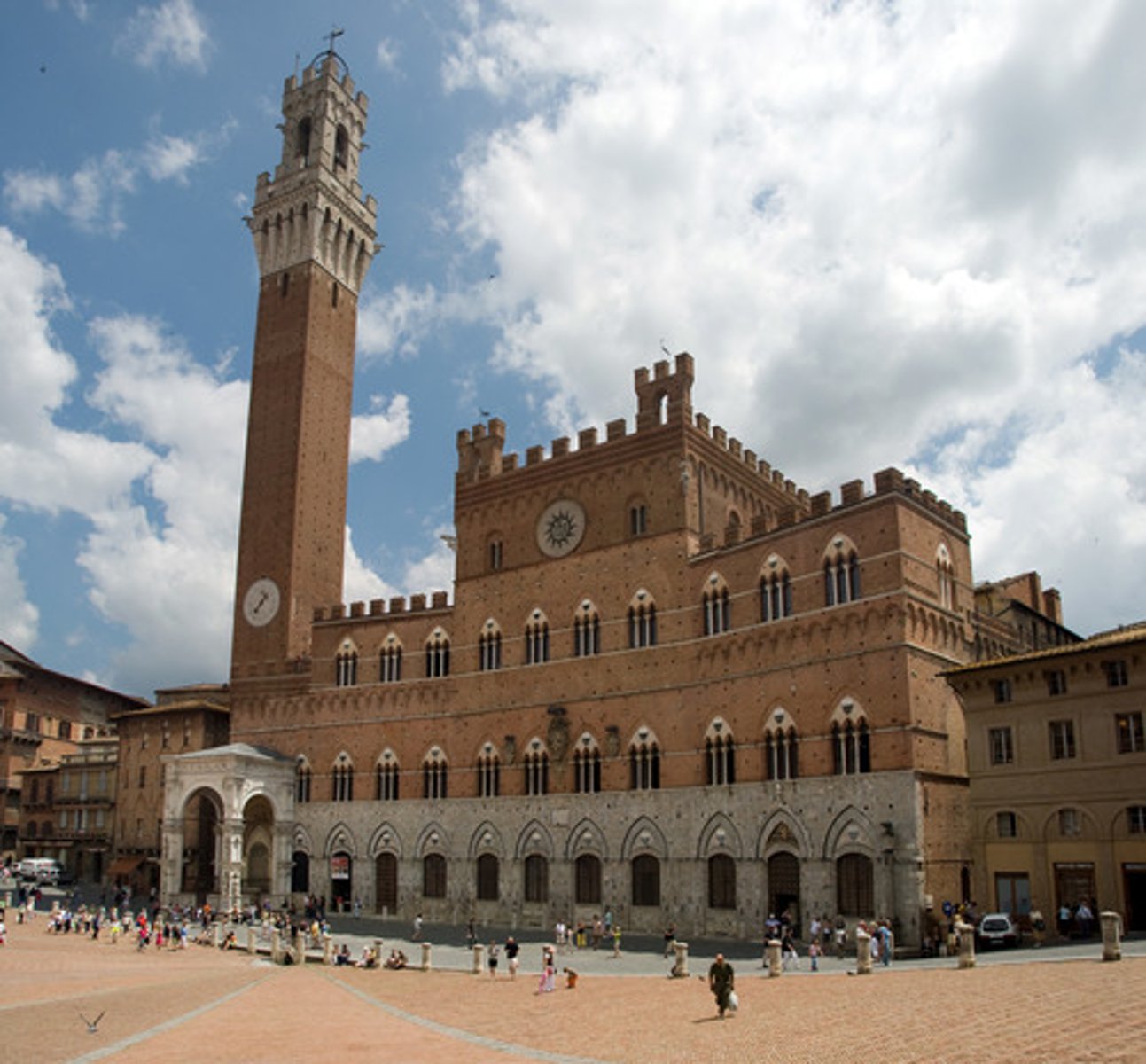
Ambrogio Lorenzetti, Peaceful City, Peaceful Country, Palazzo Pubblico, 14th century CE. Late Medieval Italy.
Peaceful city - how justice and art combine in meaningful ways, sense of order and justice
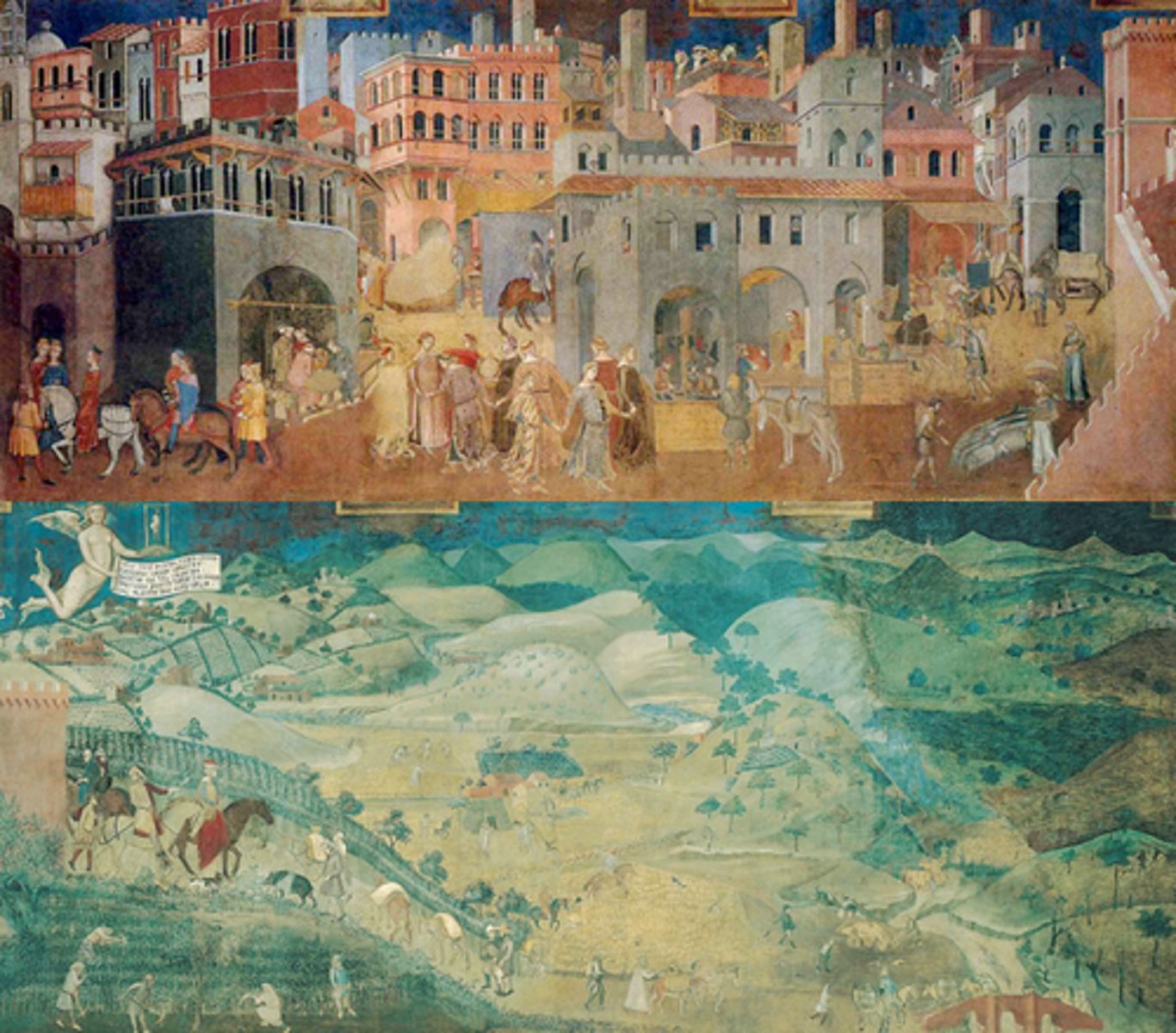
Doge's Palace, 15th century CE, Venice, Italy. Late Medieval
Floats between water and air
Each story is taller than the one underneath and makes an illusion as though it is going to fall over
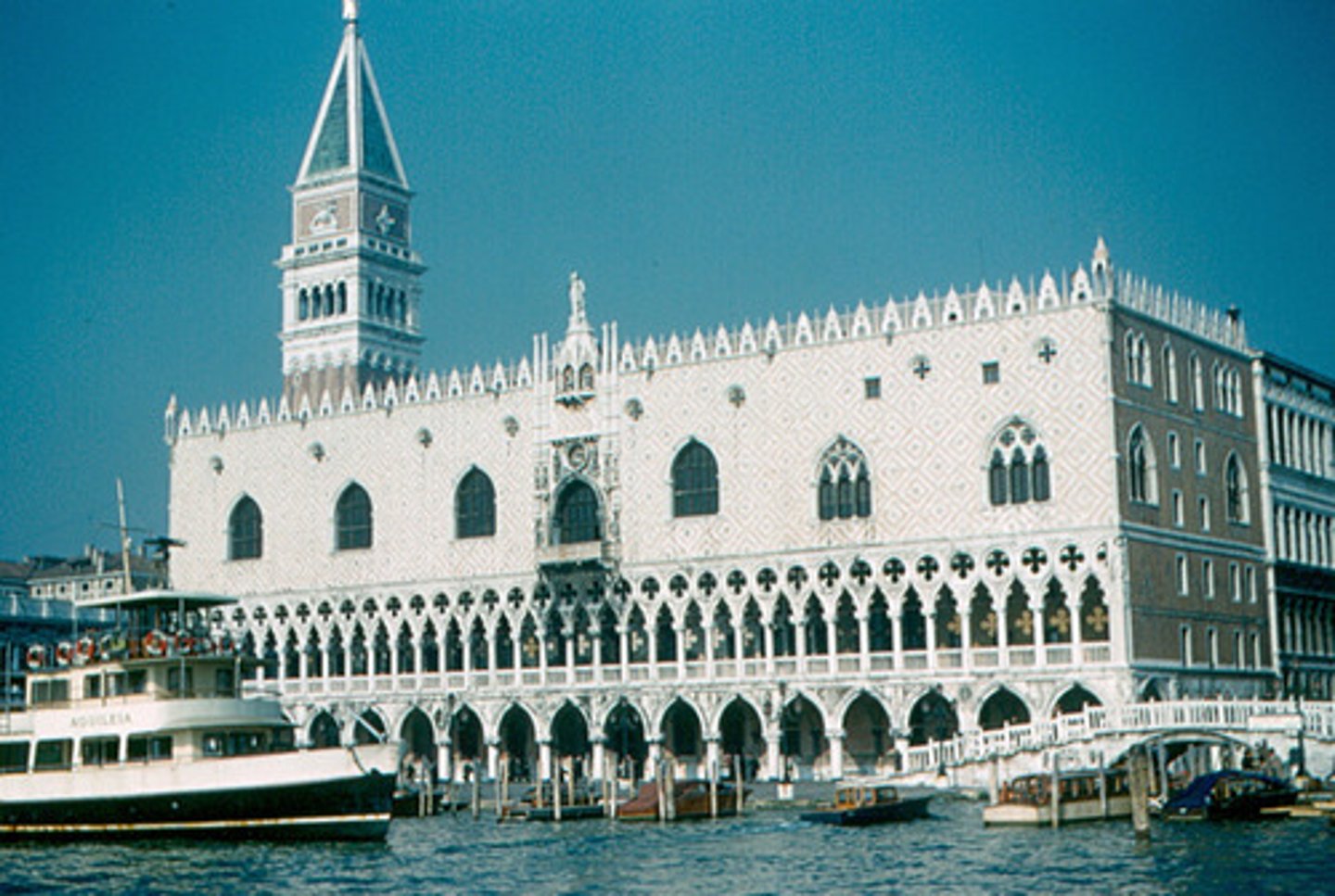
Chartres Cathedral, 12th century CE, France. Gothic
Pilgrimage destination— the pilgrimage was dedicated to the Virgin Mary
Santis Martin, Jerome, and Gregory Jamb Statues on the south transept right doorway
Saint Theodore Jamb Statue on the south transept left doorway - one bent leg, known as the knight of Christianity
West facade has archivolts with relief sculpture, tympanum, lintel below the tympanum, and engages columns below the lintel that make up jamb figures. The arches are pointed
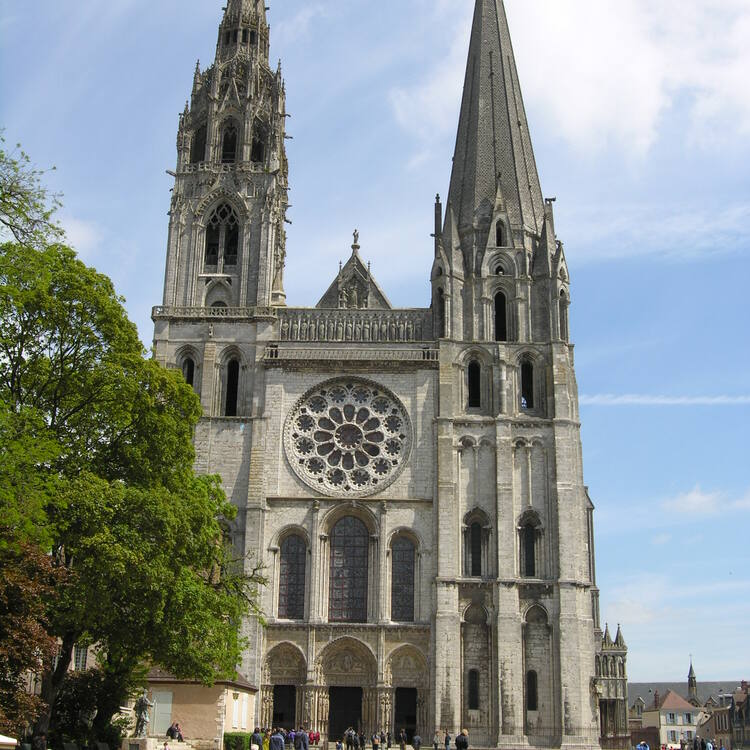
Santis Martin, Jerome, and Gregory, jamb statues, Porch of the Confessors (right doorway), south transept, Chartres Cathedral, France, 13th Century. Gothic
Used to be painted
They loom over you
Slightly tilted head towards the viewer below
These figures are more independent than those on the west portal
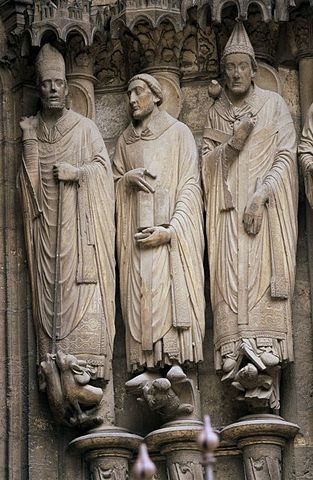
Saint Theodore, jamb statue, Porch of the Martyrs (left doorway), south transept, Chartres Cathedral, France, 13th century. Gothic
Knight of Christianity
One bent leg
Established Polykleitos’ canon of proportions, setting ideal correlations among body parts
Harmony of opposites

Saint-Denis Church, France, 12th century CE. Gothic
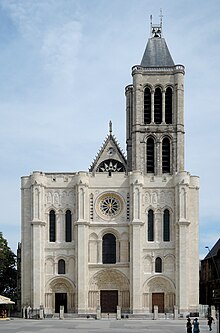
Saint Denis Church Interior, 12th century CE, Paris, France. Gothic
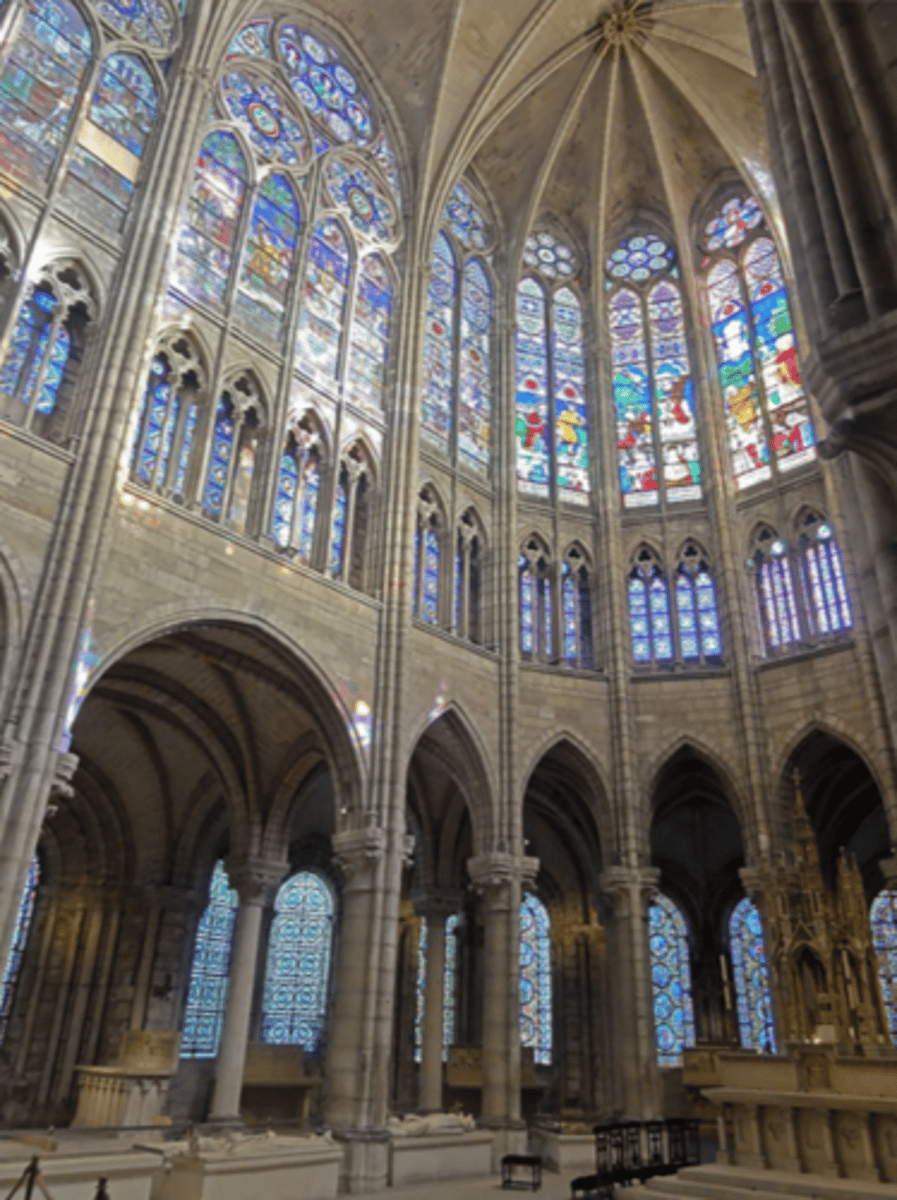
Notre-Dame, Paris, France, 12th century CE. Gothic
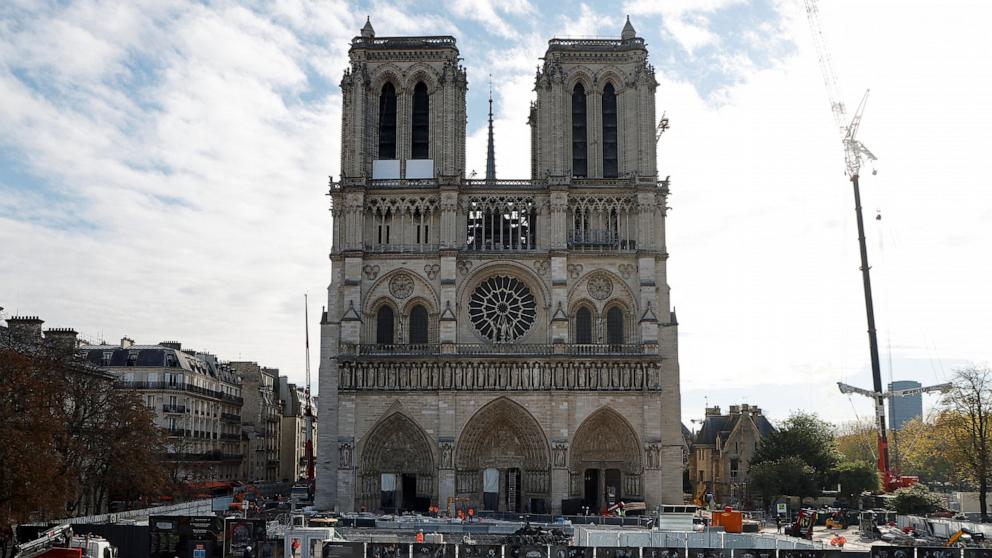
West facade of Reims Cathedral, Reims, France, 13th Century. Gothic
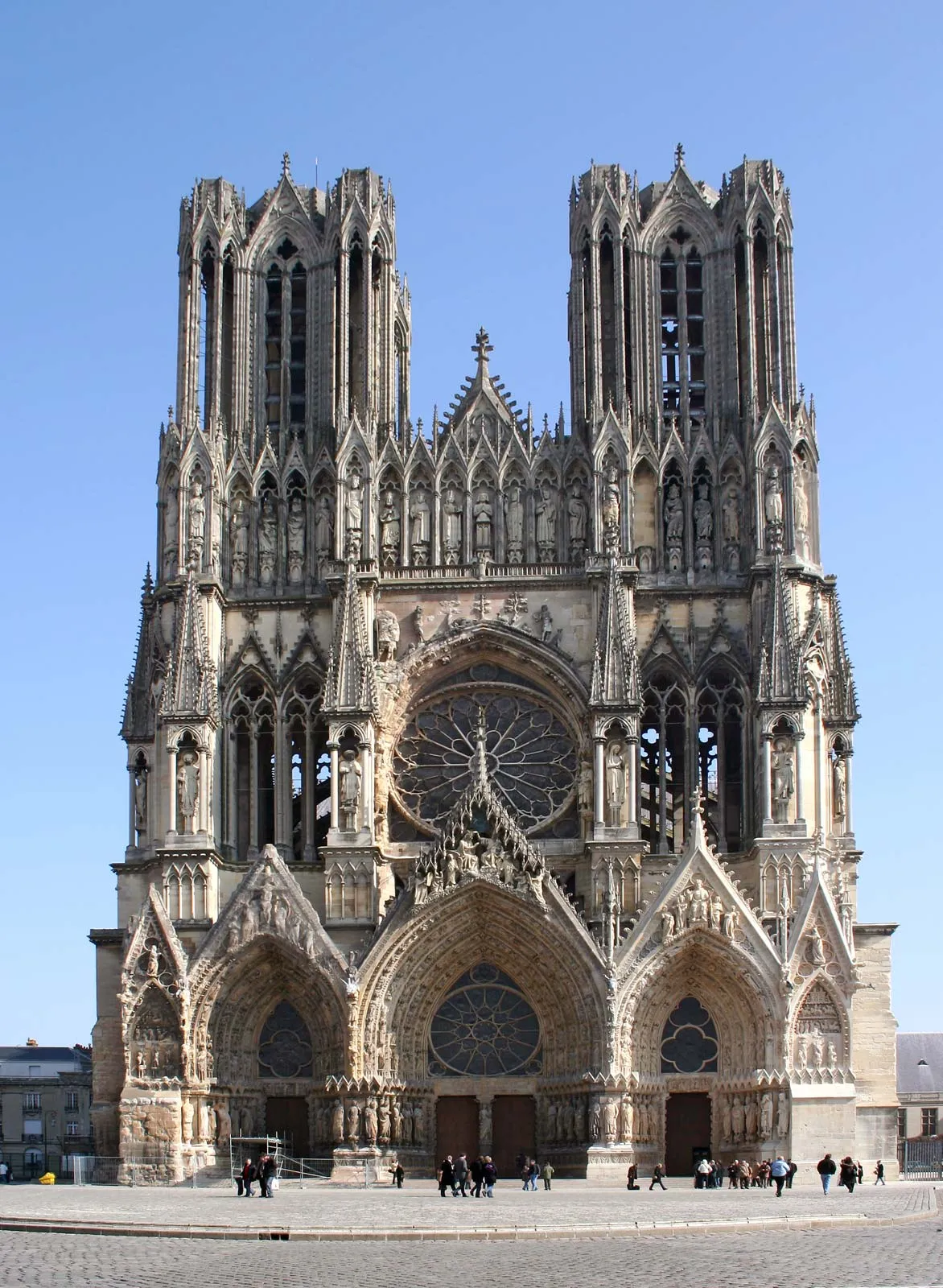
Annunciation and Visitation, jamb statues of the central doorway, west facade, Reims Cathedral, France, 13th century. Gothic
Depicts the moment Mary is told that she is having a miraculous birth of Christ
Elizabeth and Mary are both pregnant
Heavy drapery and bent legs
Arc Angel Gabriel has rainbow wings, something we have seen previously in Etruscan art
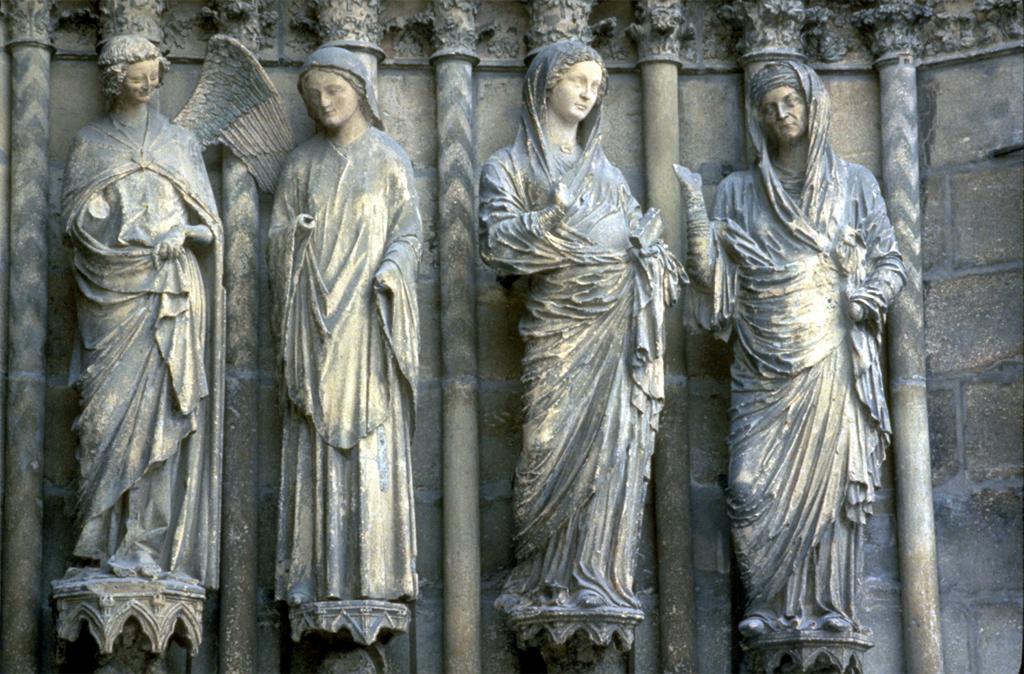
Virgin Mary detail of the west facade of Reims Cathedral, France. 13th century. Gothic
Mary is the youthful (royal) mother of god
Earthly power and divine power combined
